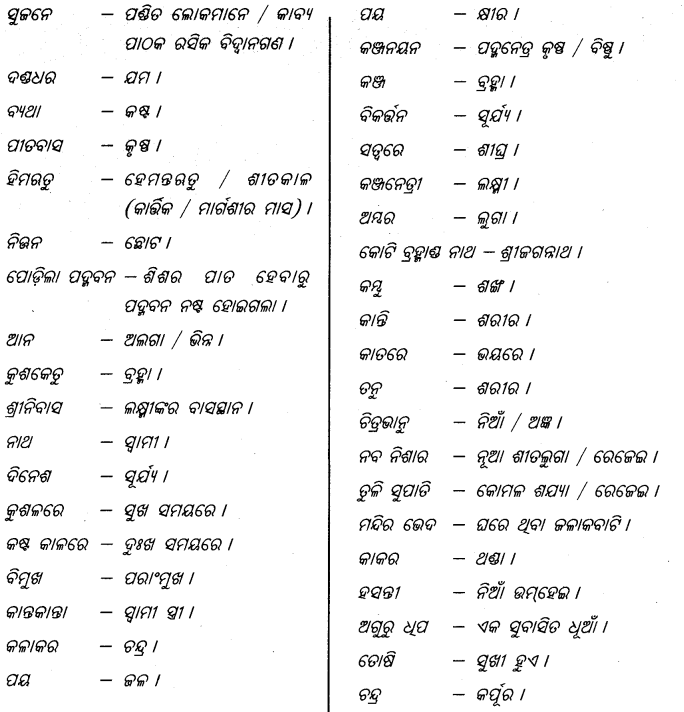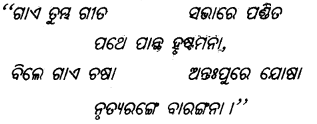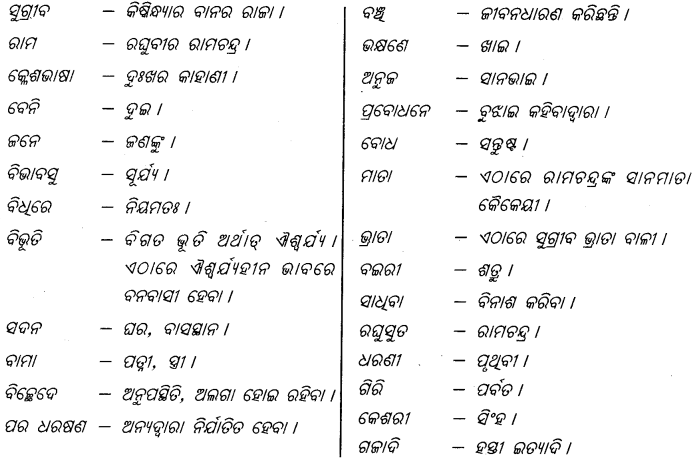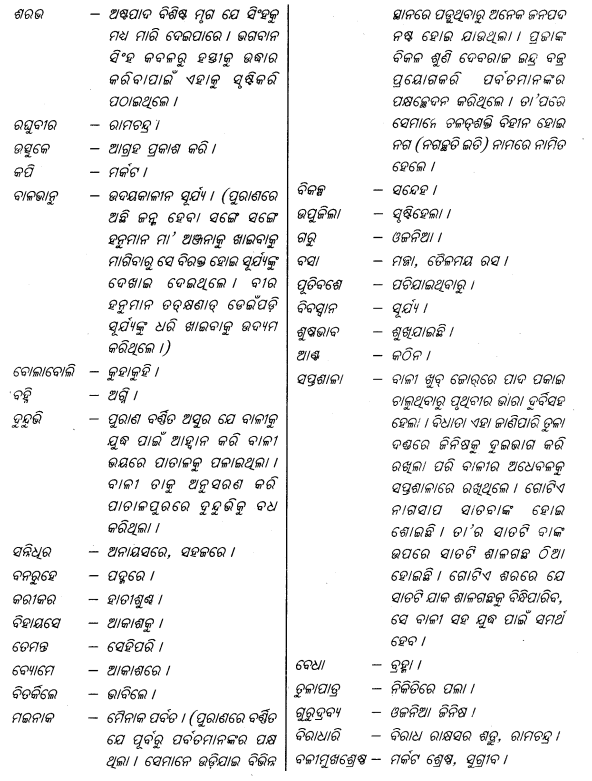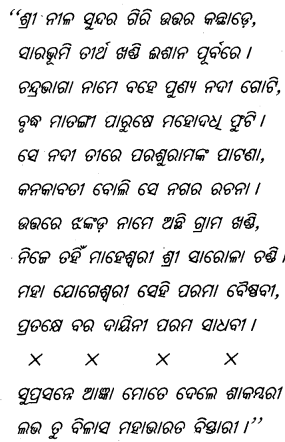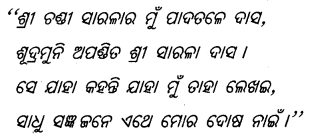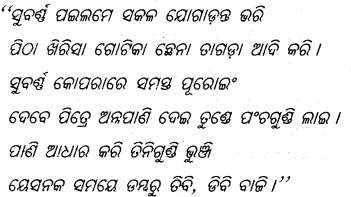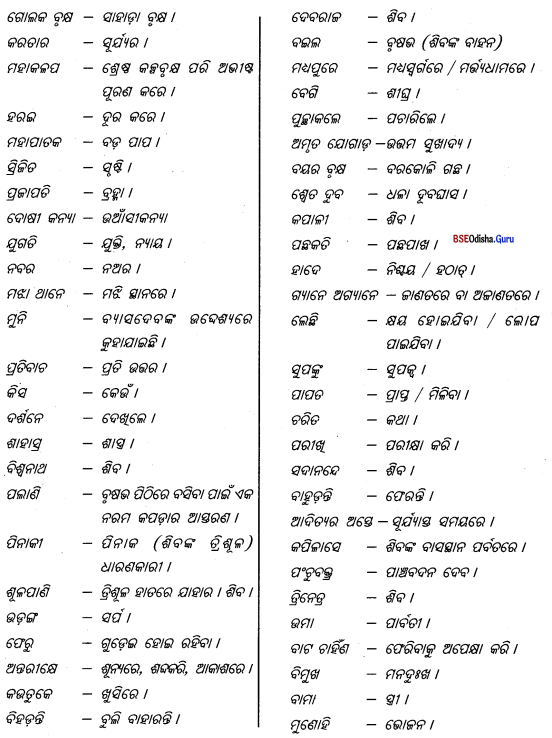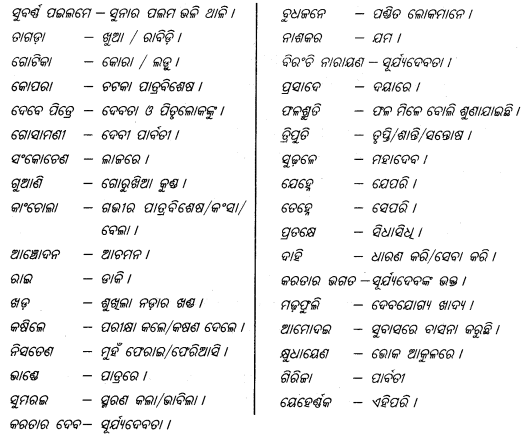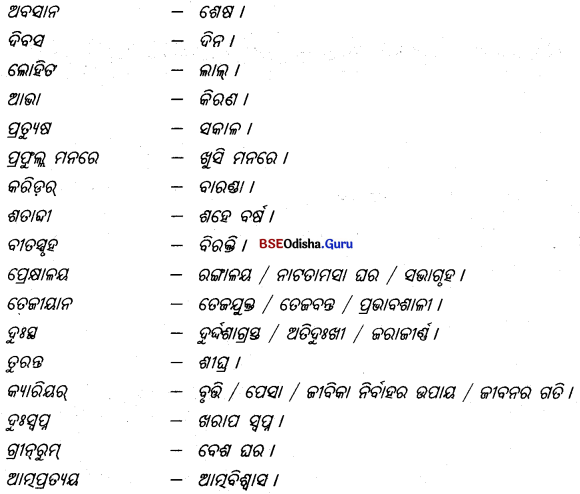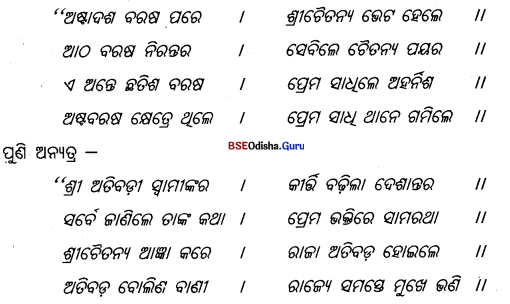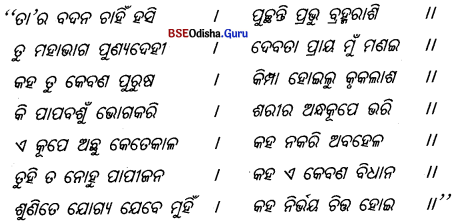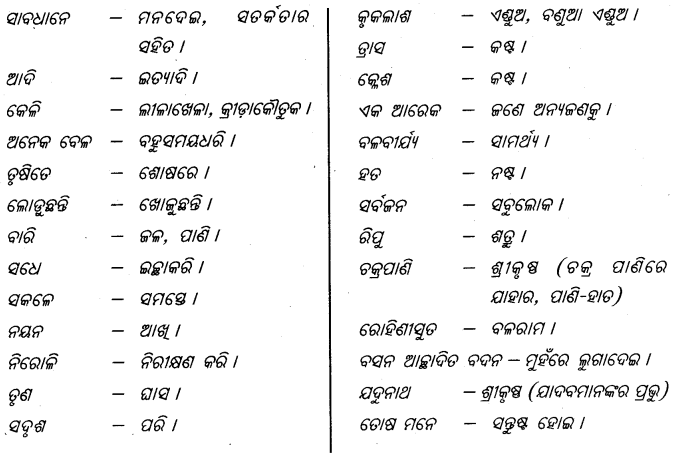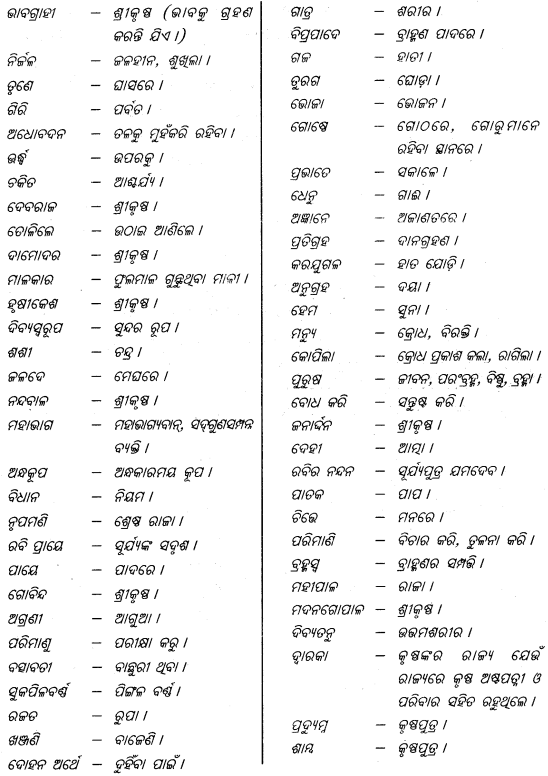Odisha State Board CHSE Odisha Class 11 Odia Solutions Chapter 11 ଭାଲୁ ଉପଦ୍ରବ Textbook Exercise Questions and Answers.
CHSE Odisha Class 11 Odia Chapter 11 ଭାଲୁ ଉପଦ୍ରବ Question Answer
ପାଠ୍ୟପୁସୃଜମ ପ୍ତଖାବଲାଭ ଇଉର :
Question 1.
ପ୍ରଶ୍ନର ମୂଲ୍ୟ ୧ ନମ୍ବର। ଚାରିଗୋଟି ସମ୍ଭାବ୍ୟ ଉତ୍ତର ମଧ୍ୟରୁ ଠିକ୍ ଉତ୍ତରଟି ବାଛି ଲେଖ ।
(କ) ରେଡ଼ିଓର ଜରୁରୀ ଘୋଷଣା ଶୁଣିବାବେଳକୁ ସୁରେଶ କ’ଣ ଭାଙ୍ଗୁଥୁଲା ? (ପଥର, ମୁଗୁର, ଇଟା, ହାତୁଡ଼ି)
Solution:
ମୁଗୁର
(ଖ) କିଏ ଯାଇ ରେଡ଼ିଓ ବନ୍ଦ କରି ଦେଇଚି ? (ଦେବକାନ୍ତ, ନିଶାକର, ଗୋପୀ, ମନମୋହନ)
Solution:
ମନମୋହନ
(ଗ) କେଉଁ ଖବରଟା ବେଳେବେଳେ ସତ ହୋଇଯାଏ ବୋଲି ନିଶାକର କହିଛନ୍ତି ? (ସକାଳ, ମଧ୍ୟାହ୍ନ, ଅପରାହ୍ନ, ସନ୍ଧ୍ୟା)
Solution:
ସକାଳ
(ଘ) କୈଳାସର ସଂସ୍କୃତ ଶ୍ଳୋକ ଶୁଣି ତାହା କେଉଁ ଭାଷାର ବୋଲି ସୁରେଶ କହିଛନ୍ତି ? ( ଓଡ଼ିଆ, ହିନ୍ଦୀ, ତେଲୁଗୁ, ତାମିଲ)
Solution:
ତେଲୁଗୁ
(ଙ) କେଉଁ କଥା ଭୟାନକ ବୋଲି ଗୋପୀ କହିଛି ? (ଭାଲୁକାମୁଡ଼ା, ଭାଲୁର ଜିଭଚଟା, ଭାଲୁ ଆମ୍ପୁଡ଼ା, ଭାଲୁ ଘୋଷରା)
Solution:
ଭାଲୁ ଆମ୍ପୁଡ଼ା
(ଚ) ଭାଲୁ ଆଦୌ କ’ଣ ସହିପାରେ ନାହିଁ ? (ବନ୍ଧୁତା, ମାନବିକତା, ବିଶ୍ଵସଘାତକତା, ଶଠତା)
Solution:
ବିଶ୍ଵସଘାତକତା
(ଛ) ମନମୋହନଙ୍କ ଭାଇଟିର କେତେବେଳେ ଇଣ୍ଟରଭିଉ ଥିଲା ? (ଆଠଟାରେ, ନଅଟାରେ, ଦଶଟାରେ, ସାଢ଼େ ଦଶଟାରେ)
Solution:
ଦଶଟାରେ
(ଜ) କୈଳାସଙ୍କର ସେଦିନ ଜଣକ ସାଙ୍ଗରେ କେଉଁଠି ଦେଖାକରିବାର ଥିଲା ? (ବସ୍ଷ୍ଟାଣ୍ଡରେ, ମେଡ଼ିକାଲରେ, ରେଡ଼ିଓ ଷ୍ଟେସନରେ, ଷ୍ଟେସନରେ )
Solution:
ଷ୍ଟେସନରେ

(ଝ) ନିଶାକରବାବୁ ଖଟ ଉପରେ କ’ଣ ଦେଖ୍ ଭା…. ବୋଲି କହିଲେ ? (କଳାଚାଦର, କଳାବେଡ଼ସିଟ୍, କଳାକମ୍ବଳ, କଳାରେଜେଇ)
Solution:
କଳାକମ୍ବଳ
(ଞ) କମ୍ବଳଟା କିଏ ଘୋଡ଼ିହୋଇ ଶୋଇଥିଲା ? (ସୁରେଶ, ଦେବକାନ୍ତ, ଗୋପୀ, ମନମୋହନ)
Solution:
ଗୋପୀ
(ଟ) ଭାଲୁର କାହାପ୍ରତି ଆଲର୍ଜି ବୋଲି ମନମୋହନ କହିଛନ୍ତି ? (ଅନ୍ଧାର, ଆଲୁଅ, ଦ୍ବିପ୍ରହର, ସକାଳ)
Solution:
ଆଲୁଅ
(୦) କେଉଁ ଭାଲୁ ଜଙ୍ଗଲରୁ ଆସି ଆମ ପାଇଖାନାରେ ଲୁଚିନାହିଁ ବୋଲି ମନମୋହନ କହିଲେ ? (ସହରୀଭାଲୁ, ଭୟାନକ ଭାଲୁ, କବିତାର ଭାଲୁ, ଗପର ଭାଲୁ)
Solution:
ଗପର ଭାଲୁ
(ଉ) ‘ଆଲୁଅରେ ଖାଇଲେ ଗୁଡ଼, ଅନ୍ଧାରରେ ଖାଇଲେ ତ ସେଇ ଗୁଡ଼’’ ଏହା କିଏ କହିଛି ? (ମନମୋହନ, ନିଶାକର, ସୁରେଶ, ଗୋପୀ)
Solution:
ନିଶାକର
(ଢ) କେଉଁ କଥା ବରଦାସ୍ତ କରିପାରିବେନି ବୋଲି ସୁରେଶ କହିଛନ୍ତି ? (ଭାଲୁ, ବନ୍ଦ, ଅପମାନ, ଭୟ)
Solution:
ବନ୍ଦ
(ଣ) ଦରକାର ପଡ଼ିଲେ କିଏ ଭାଲୁଠୁ ଆହୁରି ବେଶି ହିଂସ୍ର ହୋଇପାରେ ? (ସିଂହ, ବାଘ, ଗୟଳ, ମଣିଷ)
Solution:
ମଣିଷ
(ତ) ଇଚ୍ଛାକଲେ ମଣିଷ ବି କ’ଣ ହୋଇପାରେ ବୋଲି ମନମୋହନ କହିଛନ୍ତି ? (ହତ୍ୟାକାରୀ, ପଶୁ, ପ୍ରତିଶୋଧପରାୟଣ, କ୍ଷମାଶୀଳ)
Solution:
ପଶୁ
(ଥ) ଗୋପୀକୁ କିଏ ପିଟିଲା ବୋଲି ସେ କହିଥିଲା ? (ଭୂତ, ଭାଲୁ, ପୋଲିସ, କିଏ ଜଣେ)
Solution:
ଭାଲୁ
(ଦ) କୈଳାସ କ’ଣ ବଜେଇ ବଜେଇ ଭିତରକୁ ଆସିଥିଲା ? (ବଂଶୀ, କେନ୍ଦରା, ଖଞ୍ଜଣୀ, ମୃଦଙ୍ଗ)
Solution:
ମୃଦଙ୍ଗ
(ଧ) କୈଳାସ କ’ଣ ହୋଇଗଲା ବୋଲି ସୁରେଶ କହିଛନ୍ତି ? (କଳାକାର, ଯୋଗୀ, ପାଗଳ, ପଣ୍ଡିତ)
Solution:
ପାଗଳ
(ନ) ଏ ଭାଲୁର ପୂର୍ବପୁରୁଷ କିଏ ବୋଲି କୈଳାସ କହିଛି ? (ହନୁମାନ, ଜାମ୍ବବାନ, ସୁଗ୍ରୀବ, ଅଙ୍ଗଦ)
Solution:
ଜାମ୍ବବାନ
(ପ) ଭାଲୁକୁ ମାରିଲେ ଏହା କେଉଁଭଳି ଏକ ଇସ୍ୟୁ ହୋଇଯିବ ବୋଲି କୁହାଯାଇଛି ? (ଅଯୋଧ୍ୟା, ଲଙ୍କା, କିଷ୍କିନ୍ଧ୍ୟା, କାଶ୍ମୀର)
Solution:
ଅଯୋଧ୍ୟା
(ଫ) କିଏ ଗୋପୀକୁ ନିଶାକରର ଜିମାରେ ଛାଡ଼ିଦେଇ ଯାଇଥିଲେ ? (ତା’ ମାଆ, ତା’ ବୁଢ଼ୀମା’, ତା’ ବାପା, ତା’ ବୁଢ଼ାବାପା)
Solution:
ତା’ ବୁଢ଼ୀମା’
Question 2.
ଗୋଟିଏ ବାକ୍ୟରେ ଉତ୍ତର ଲେଖି। ପ୍ରଶ୍ନର ମୂଲ୍ୟ ୧ ନମ୍ବର ।
(କ) ରେଡ଼ିଓର ଜରୁରୀ ଘୋଷଣା ଶୁଣି କୈଳାସର ଅବସ୍ଥା କ’ଣ ହୋଇଚି ?
Solution:
ରେଡ଼ିଓର ଜରୁରୀ ଘୋଷଣା ଶୁଣି ଣାପାପାନରେ ଥିବା କୈଲାସର ଗୋଡ଼ ଦୁଇଟା ତଳକୁ ଓଦେଳ ଥାପିଛି ଏବଂ ସେ ପ୍ରାୟ ଫ୍ଲାଟ ହୋଇଯାଇଛି ।
(ଖ) ସହର ଭିତରକୁ ଭାଲୁଟିଏ ପଶି ଆସିଥିବାର ଶୁଣି ସୁରେଶର ଅବସ୍ଥା କ’ଣ ହୋଇଛି ?
Solution:
ସହର ଭିତରକୁ ଭାଲୁଟିଏ ପଶି ଆସିଥିବାର ଶୁଣି ମୁଗୁର ଭାଙ୍ଗୁଥିବା ସୁରେଶ ମହିଷାସୁର ମର୍ଦ୍ଦିନୀ ପରି ଲୋରେ ମିଳ ହୋଲମାଲଛି |
(ଗ) ରେଡ଼ିଓ କେଉଁସବୁ ବିଷୟରେ ମିଛ କହେ ବୋଲି କୈଳାସ କହିଛି ?
Solution:
ରେଡ଼ିଓ, ବଜାର ଦର, ପାଣିପାଗ, ବନ୍ୟା, ମରୁଡ଼ି ବିଷୟରେ ମିଛ କହେ ବୋଲି କୈଳାସ କହିଛି
(ଘ) ସସେମିରା ପ୍ରସଙ୍ଗରେ କିଏ ସଂସ୍କୃତ ଶ୍ଳୋକଟିଏ କହିଛି ?
Solution:
ସସେମିରା ପ୍ରସଙ୍ଗରେ କୈଳାସ ସଂସ୍କୃତ ଶ୍ଳୋକଟିଏ କହିଛି ।
(ଙ) କୌଣସି ଏକ ଭାଲୁ କାହିଁ ଜିଭରେ ସସେମିରା ଲେଖ୍ ଦେଇଥିଲା ?
Solution:
କୌଣସି ଏକ ଭାଲୁ କଦ୍ଵା ଜିଭରେ ସସେମିରା ଲେଖ୍ ଦେଇଥିଲା |
(ଚ) ଆଜି ଆଉ ବଜାରି ଯିବା ସମ୍ଭବ ନୁହେଁ ବୋଲି ନିଶୀକର କାହିଁକି କହିଛି ?
Solution:
ରାଲ୍ମ ସନରକୃ ପଣିଆପିଛି ଖବର ଶୁଣିବାପରେ ଆଉ ବଜାର ଯିବା ସମ୍ଭବ ନୁହେଁ ବୋଲି ନିଶାକର କହିଛି ।
(ଛ) ଭାଲୁ କେଉଁବାଟ ଦେଇ ବାଥରୁମ୍କୁ ପଶି ଆସିଥିଲା ବୋଲି ଦେବକାନ୍ତ ଅନୁମାନ କରିଛି ?
Solution:
ଭାଲୁ ପଛପଟ ଖୋଲା ଦରଜା ଦେଇ ବାୟୁମକୁ ପଶି ଆସିଥିଲା ବୋଲି ଦେବକାନ୍ତ ଅନୁମାନ କରିଛି ।
(କ) ଭାଲୁ ବେଡ଼ରୁମ୍ରେ ଢୁକିଥିଲେ କ’ଣ ହୋଇଥାଆନ୍ତା ?
Solution:
ଭାଲୁ ବେଡ଼ରୁମ୍ରେ ଢୁକିଥିଲେ ପିଣ୍ଡାରେ ମଣିଷ ଶୋଇ ପଡ଼ିଥାନ୍ତା।
(ଝ) ଭାଲୁ କେଉଁଠି ଥିଲେ ବାହାରିବାର ଉପାୟ ନାହିଁ ବୋଲି ମନମୋହନ କହିଛି ?
Solution:
ଭାଲୁ ବାହାରେ ଥିଲେ ଯେମିତି ବାହାରିବାର ଉପାୟ ନାହିଁ, ଭିତରେ ଥିଲେ ବି ସେମିତି ବାହାରିବାର ଉପାୟ ନାହିଁ ବୋଲି ମନମୋହନ କହିଛି |
(ଞ) କେଉଁଠି ଭାଲୁ ଉପଦ୍ରବ ଆରମ୍ଭ ହୋଇଯାଇଛି ବୋଲି ନିଶାକର କହିଲେ ?
Solution:
ସହରରେ ନୁହେଁ, ଆମର ଏ ମେସ୍ ଭିତରେ ଭାଲୁ ଉପଦ୍ରବ ଆରମ୍ଭ ହୋଇଯାଇଛି ବୋଲି ନିଶାକର କହିଛି |
(ଟ) ନିଶାକରବାବୁ ଗୋପୀକୁ ଠେଲିଦେଇ କ’ଣ କହିଥିଲେ ?
Solution:
ନିଶାକରବାବୁ ଗୋପୀକୁ ଠେଲିଦେଇ, ‘ଖାଲି ସବୁବେଳେ ସପନ ଦେଖୁଥା’ ବୋଲି କହିଥିଲେ ।
(୦) ମନମୋହନ ଭାଲୁକୁ ଶୋଇଥିବାର ଦେଖୁବାବେଳେ ଭାଲୁ କେଉଁ ଅବସ୍ଥାରେ ଥିଲା ବୋଲି ନିଶାକର କହିଲେ ?
Solution:
ମନମୋହନ ଭାଲୁକୁ ଶୋଇଥବାର ଦେଖିବାବେଳେ, ସେତେବେଳେ ଦିନଥିବାରୁ, ଜରରେ କମ୍ପୁଥିଲା ବୋଲି ନିଶାକର କହିଲେ ।

(ଙ) ମନମୋହନ ଓ ନିଶାକର ଭାଲୁ ସମ୍ପର୍କରେ କଥା ହେଲାବେଳେ ସୁରେଶ ହାତରେ କ’ଣ ସବୁ ଧରି ଆସିଥିଲେ ?
Solution:
ମନମୋହନ ଓ ନିଶାକର ଭାଲୁ ସମ୍ପର୍କରେ କଥା ହେଲାବେଳେ ସୁରେଶ ହାତରେ ଗୋଟାଏ ବଲ୍ବ୍ ହୋଲତର ସହିତ କିଛି ତାର ଓ ହାତୁଡ଼ି ଧରି ଆସିଥିଲେ ।
(ଢ) କେଉଁ କଥା ପ୍ରମାଣ ମାଗିଲେ ଦବା କଷ୍ଟକର ବୋଲି ନିଶାକର କହିଛି ?
Solution:
ଏ ଜଗତଟା ବିଶ୍ଵାସରେ ଚାଲିଛି, ମାତ୍ର ଏହା ପ୍ରମାଣ ମାଗିଲେ ଦବା କଷ୍ଟକର ବୋଲି ନିଶାକର କହିଛି ।
(ଣ) ଆଲୁଅ ନ ଜାଳିବାକୁ ନିଶାକର କାହିଁକି କହିଛି ?
Solution:
ଭାଲୁର ବିଶ୍ଵାସ ପ୍ରତି ଆସ୍ଥାରଖି ଆଲୁଅ ନ ଜାଳିବାକୁ ନିଶାକର କହିଛି ।
(ତ) ଭାଲୁର କେଉଁ କଥା ପ୍ରତି ଆଶା ରଖାଯାଉ ବୋଲି ନିଶାକର କହିଛି ?
Solution:
ଭାଲୁର ବିଶ୍ଵାସ ପ୍ରତି ଆଶା ରଖାଯାଉ ବୋଲି ନିଶାକର କହିଛି ।
(ଥ) କେଉଁ କଥାସବୁ ବନ୍ଦ ବୋଲି ସୁରେଶ କହିଛି ?
Solution:
ଖାଇବା, ଶୋଇବା, ଝାଡ଼ା, ପରିସ୍ରା ସବୁ ବନ୍ଦ ବୋଲି ସୁରେଶ କହିଛି ।
(ଦ) ଭାଲୁ ବିଷୟରେ କାହାକୁ ଖବର ଦେବେ ବୋଲି ମନମୋହନ କହିଛି ?
Solution:
ଭାଲୁ ବିଷୟରେ anti ଭାଲୁ Squard କୁ ଖବର ଦେବେ ବୋଲି ମନମୋହନ କହିଛି ।
(ଧ) ସ୍କାର୍ଡ଼ ଫୁଆଡ଼୍ କଥା ରଖି କ’ଣ ଦରକାର ବୋଲି ମନମୋହନ କହିଛି ?
Solution:
ସ୍ଫୁର୍ଡ଼ ଫୁଆଡ଼୍ କଥା ରଖି ଘରବାଲା ଚୂନ ଦେବାପାଇଁ ଯେଉଁ ବାଉଁଶ ରଖିଥିଲା ସେଇଥୁରୁ ଗୋଟିଏ ଦରକାର ବୋଲି ମନମୋହନ କହିଛି ।
(ନ) ବହିରେ କ’ଣ ଲେଖୁଚି ବୋଲି ଦେବକାନ୍ତ କହିଛି ?
Solution:
ଭାଲୁ ଗୋଟିଏ ହିଂସ୍ର ପ୍ରାଣୀ ଓ ପ୍ରତିଶୋଧପ୍ରବଣ ବୋଲି ବହିରେ ଲେଖିଚି ବୋଲି ଦେବକାନ୍ତ କହିଚି ।
(ପ) ଭାଲୁଟାର କେଉଁ ଜ୍ଞାନ ନାହିଁ ବୋଲି ନିଶାକର କହିଛି ?
Solution:
ଭାଲୁ ଗୋପୀ ଗାଲରେ ମାରିଥିବାରୁ, ତା’ର ବଡ଼ସାନ ଜ୍ଞାନ ନାହିଁ ବୋଲି ନିଶାକର କହିଛି ।
(ଫ) ରାତିଟାର କଥା ବୋଲି ନିଶାକର କାହିଁକି କହିଛି ?
Solution:
ରାତିଟାର କଥା ବୋଲି ନିଶ୍କର କହିଛି, କାରଣ ରାତି ପାହିଲେ ଭାଲୁ ଭାଲୁ ବାଟରେ ଓ ଆମେ ଆମ କାହିଁକି କହିଛି |
Question 3.
ଦୁଇଟି ବାକ୍ୟରେ ଉତ୍ତର ଲେଖ । ପ୍ରଶ୍ନର ମୂଲ୍ୟ ୨ ନମ୍ବର । ଲେଖା ଓ ଲେଖକଙ୍କ ସୂଚନା ପାଇଁ ୧ ନମ୍ବର ଓ ଉତ୍ତର ପାଇଁ ୧ ନମ୍ବର ରହିବ ।
(କ) ସହର ଭିତରକୁ ଭାଲୁଟାଏ ପଶି ଆସିଥିର ନିଶାକରଠାରୁ ଶୁଣି ମନମୋହନ କ’ଣ କହିଛି ?
Solution:
‘ଭାଲୁ ଉପଦ୍ରବ’ ଏକାଙ୍କିକାରେ ନାଟ୍ୟକାର ବିଜୟ ମିଶ୍ର ଏହା ଉଲ୍ଲେଖ କରିଛନ୍ତି । ସହର ଭିତରକୁ ଭାଲୁଟାଏ ପଶି ଆସିଥିର ନିଶାକରଠାରୁ ଶୁଣି ମନମୋହନ କହିଛି, ଆପଣ ଗାଲୁଆମି କରି, ବଜାର ନ ଯାଇ, ଯାହା ପଚରା ପୋକରା ବଳକା ପରିବା ଅଛି, ସେଇଥରେ ଚଳେଇ ନେବେ ବୋଲି ଚାହିଁଛନ୍ତି ।
(ଗ) କେଉଁ କଥା ମନମୋହନ ଜାଣିପାରିବନି ବୋଲି ଗୋପୀ ମନମୋହନକୁ କହିଛି ?
Solution:
‘ଭାଲୁ ଉପଦ୍ରବ’ ଏକାଙ୍କିକାରେ ନାଟ୍ୟକାର ବିଜୟ ମିଶ୍ର ଏହା ଉଲ୍ଲେଖ କରିଛନ୍ତି । ସହରରେ ରହୁଥିବା ଲୋକ ହିସାବରେ ଭାଲୁ ଆମ୍ପୁଡ଼ା କି ଭୟାନକ ସେ କଥା ମନମୋହନ ଜାଣିପାରିବନି ବୋଲି ଗୋପୀ ମନମୋହନକୁ କହିଛି ।
(ଘ) ‘ଆପଣ ଯାହା ଭାବିପାରନ୍ତି”…..ଏହା କିଏ କେଉଁ ପ୍ରସଙ୍ଗରେ କହିଛି ?
Solution:
‘ଭାଲୁ ଉପଦ୍ରବ’ ଏକାଙ୍କିକାରେ ନାଟ୍ୟକାର ବିଜୟ ମିଶ୍ର ଏହା ଉଲ୍ଲେଖ କରିଛନ୍ତି । ‘ଆପଣ ଯାହା ଭାବି ପାରନ୍ତି’… ଏହା ନିଶାକର ରୋଷେଇ ବନ୍ଦ ପ୍ରସଙ୍ଗରେ କହିଛି ।
(ଙ) ଭାଲୁର ଯିବା ଆସିବା ସମ୍ପର୍କରେ ମନମୋହନ କ’ଣ କହିଛି ?
Solution:
‘ଭାଲୁ ଉପଦ୍ରବ’ ଏକାଙ୍କିକାରେ ନାଟ୍ୟକାର ବିଜୟ ମିଶ୍ର ଏହା ଉଲ୍ଲେଖ କରିଛନ୍ତି । ଭାଲୁର ଯିବା ଆସିବା ସମ୍ପର୍କରେ ମନମୋହନ କହିଛି, ‘ଭାଲୁ କ’ଣ ଟୁର୍ ପ୍ରୋଗ୍ରାମ୍ ଦେଇ ସହରକୁ ଗସ୍ତ କରିବାକୁ ଆସିଛି ଯେ ତା’ମିତା ଥାପିବା କଥା କଣାପଡିବ ?
(ଚ) ସୁରେଶର ସେଦିନ କ’ଣ କାମ ଥିଲା ବୋଲି ସେ କହିଛି ?
Solution:
‘ଭାଲୁ ଉପଦ୍ରବ’ ଏକାଙ୍କିକାରେ ନାଟ୍ୟକାର ବିଜୟ ମିଶ୍ର ଏହା ଅଫିସ୍ରେ ଗୋଟାଏ ଜରୁରୀ ଫାଇଲ୍ dispose କରିବାର ଥିଲା ଉଲ୍ଲେଖ କରିଛନ୍ତି । ସୁରେଶର ସେଦିନ ବୋଲି ସେ କହିଛି ।
(ଛ) ସରକାର ସମସ୍ତଙ୍କୁ କେଉଁ ବିଷୟରେ ଜଣାଇବାକୁ ଅନୁରୋଧ କରିଥିଲେ ?
Solution:
‘ଭାଲୁ ଉପଦ୍ରବ’ ଏକାଙ୍କିକାରେ ନାଟ୍ୟକାର ବିଜୟ ମିଶ୍ର ଏହା ଉଲ୍ଲେଖ କରିଛନ୍ତି । ସରକାର ଗୋଟିଏ ଅନୁସନ୍ଧାନ ସ୍କାର୍ଡ଼ ଖୋଲିଛନ୍ତି, ଯିଏ ବା ଯେଉଁମାନେ ଭାଲୁର ସନ୍ଧାନ ପାଇବେ, ତୁରନ୍ତ ସେହି ୱାର୍ଡ଼କୁ ଜଣାଇବାକୁ ଅନୁରୋଧ ।
(ଜ) ସର୍ବଶେଷ ଖବରରୁ କ’ଣ ଜଣାଯାଇଛି ବୋଲି ଆନାଉନ୍ସ ହୋଇଛି ?
Solution:
‘ଭାଲୁ ଉପଦ୍ରବ’ ଏକାଙ୍କିକାରେ ନାଟ୍ୟକାର ବିଜୟ ମିଶ୍ର ଏହା ଉଲ୍ଲେଖ କରିଛନ୍ତି । ସର୍ବଶେଷ ଖବରରୁ ଜଣାଯାଇଛି, ଆଜି ସହରରେ ହେବାକୁ ଥିବା ଇଣ୍ଟରଭ୍ୟୁ, କ୍ରିକେଟ୍ ଖେଳ ଏବଂ ଅନ୍ୟାନ୍ୟ ବ୍ୟବସ୍ଥାସବୁ ଏହି ଭାଲୁ ଉପଦ୍ରବ ପାଇଁ ବନ୍ଦ ରହିଛି ବୋଲି ଆନାଉନ୍ସ ହୋଇଛି ।
(ଝ) ଗୋପୀ ଆଖ୍ ବନ୍ଦକରି ଚିତ୍କାର କରିବା ଦେଖୁ ନିଶାକର ବାବୁ କ’ଣ କହିଛନ୍ତି ?
Solution:
‘ଭାଲୁ ଉପଦ୍ରବ’ ଏକାଙ୍କିକାରେ ନାଟ୍ୟକାର ବିଜୟ ମିଶ୍ର ଏହା ଉଲ୍ଲେଖ କରିଛନ୍ତି । ଗୋପୀ ଆଖି ବନ୍ଦ କରି ଚିତ୍କାର କରିବା ଦେଖି ନିଶାକର ବାବୁ କହିଛନ୍ତି, ‘ଆ କାହିଁକି ଏତେ ପାଟି କରୁଚ ? ଶୋଇ ପଡ଼ିଛି, ଉଠି କରିବା|
(ଞ) ମନମୋହନ ବାବୁ ଭାଲୁକୁ କେଉଁଠି ଶୋଇଥିବାର ଦେଖିଲେ ?
Solution:
‘ଭାଲୁ ଉପଦ୍ରବ’ ଏକାଙ୍କିକାରେ ନାଟ୍ୟକାର ବିଜୟ ମିଶ୍ର ଏହା ଉଲ୍ଲେଖ କରିଛନ୍ତି । ମନମୋହନ ବାବୁ ଭାଲୁକୁ ପାଇଖାନା ଭିତରେ ଶୋଇଥବାର ଦେଖିଲେ ।
(ଟ) ଶକ୍ତି ଆଉ ବଳ ମାପିବା ପାଇଁ କ’ଣ ଦରକାର ହୁଏ ବୋଲି ମନମୋହନ ନିଶାକରକୁ କହିଛି ?
Solution:
‘ଭାଲୁ ଉପଦ୍ରବ’ ଏକାଙ୍କିକାରେ ନାଟ୍ୟକାର ବିଜୟ ମିଶ୍ର ଏହା ଉଲ୍ଲେଖ କରିଛନ୍ତି । ଶକ୍ତି ଆଉ ବଳ ବୋଲି ମନମୋହନ ନିଶାକରକୁ କହିଛି |
(୦) ସୁରେଶ ଗୋପୀକୁ ଡାକି କେଉଁଠି ଆଲୁଅ ଜାଳିବାକୁ କହିଛି ଓ କାହିଁକି ?
Solution:
‘ଭାଲୁ ଉପଦ୍ରବ’ ଏକାଙ୍କିକାରେ ନାଟ୍ୟକାର ବିଜୟ ମିଶ୍ର ଏହା ଉଲ୍ଲେଖ କରିଛନ୍ତି । ସୁରେଶ ଗୋପୀକୁ ଡାକି ବାଥୁରୁମ୍ ବାହାରେ ଆଲୁଅ ଢାଳିବାକୁ କହିଛି, କାରଣ ବାଥୁରୁମ୍ ଭିତରକୁ ଯେପରି ସାମାନ୍ୟ ଆଲୁଅ ପଡ଼ିବ ।
(ଉ) ଭାଲୁ କେଉଁ ଦଣ୍ଡ ଦେବ ବୋଲି ସୁରେଶକୁ ଜଣା ନଥିଲା?
Solution:
ଦିନସାରା ଓପାସ ରହିଛନ୍ତି, ରାତିକି ଖାଇବା କଥା ଜଣାନାହିଁ, ସେଥିରେ ବାଥୁରୁମ୍ ଯିବା ମନା, ଭାଲୁ ତାଙ୍କୁ ଏପରି ଦଣ୍ଡ ଦେବ ବୋଲି ସୁରେଶକୁ ଜଣାନଥୁଲା ।
(ଢ) ସୁରେଶ ୱାର୍ଡ଼ କଥା କାହିଁକି କହୁଥିଲା ବୋଲି ମନମୋହନକୁ କହିଛି ?
—
‘ଭାଲୁ ଉପଦ୍ରବ’ ଏକାଙ୍କିକାରେ ନାଟ୍ୟକାର ବିଜୟ ମିଶ୍ର ଏହା ଉଲ୍ଲେଖ କରିଛନ୍ତି । ଭାଲୁଟିକୁ ଏ ଘରୁ ବିଦା ନକଲା ପର୍ଯ୍ୟନ୍ତ, ଏ ଘରେ କାହାରି କିଛି Freedom ନାହିଁ, ତେଣୁ ସୁରେଶ ୱାର୍ଡ଼ କଥା ମନମୋହନକୁ
(ଣ) ‘‘ଠିକ୍ କହିଛୁ ମନମୋହନ’’- ଏଠାରେ ମନମୋହନର କେଉଁ କଥାଟି ଠିକ୍ ବୋଲି କୁହାଯାଇଛି ?
Solution:
‘ଭାଲୁ ଉପଦ୍ରବ’ ଏକାଙ୍କିକାରେ ନାଟ୍ୟକାର ବିଜୟ ମିଶ୍ର ଏହା ଏଠାରେ ମନମୋହନର,‘ଠିକ୍ କହିଛୁ ମନମୋହନ ାଲୁଠାରୁ ଆହୁରି ବେଶି ହିଂସ୍ର ହୋଇପାରେ’ ‘ଦରକାର ପଡ଼ିଲେ ମଣିଷ କଥାଟି ଠିକ୍ ବୋଲି କୁହାଯାଇଛି । ଲ୍ଲେଖ କରିଛନ୍ତି ।
(ତ) ଭାଲୁ କ’ଣ କରିପାରେ ବୋଲି ଦେବକାନ୍ତ କହିଛି ?
Solution:
‘ଭାଲୁ ଉପଦ୍ରବ’ ଏକାଙ୍କିକାରେ ନାଟ୍ୟକାର ବିଜୟ ମିଶ୍ର ଏହା ଉଲ୍ଲେଖ କରିଛନ୍ତି । ଭାଲୁ ଉଚ୍ଚ ଜାଗାକୁ ଚଢ଼ିପାରେ, ଆମ୍ପୁଡ଼ା କାମୁଡ଼ା ପରି ଜାବୁଡ଼ା ବି ଲଗେଇପାରେ ବୋଲି ଦେବକାନ୍ତ କହିଛି । .
(ଥ) ‘ଟିଟ୍ ଫର୍ ଟ୍ୟା’’ ପ୍ରସଙ୍ଗରେ କ’ଣ କୁହାଯାଇଛି ?
Solution:
‘ଭାଲୁ ଉପଦ୍ରବ’ ଏକାଙ୍କିକାରେ ନାଟ୍ୟକାର ବିଜୟ ମିଶ୍ର ଏହା ଉଲ୍ଲେଖ କରିଛନ୍ତି । ଭାଲୁକୁ ଘରେ ପୂରାଇ, ତା’ଭୟରେ କାକୁସ୍ଥ ହେବା ଅପେକ୍ଷା ତାକୁ ସାମ୍ନା କରିବା ଅତ୍ୟନ୍ତ ଭଲ ପ୍ରସଙ୍ଗରେ ‘ଟିଟ୍-ଫର୍ ଟ୍ୟାଟ୍’
(ଦ) ମନମୋହନର ଉଦ୍ବୋଧନ ଶୁଣି ଗୋପୀ କ’ଣ କହିଥିଲା ?
Solution:
ଶୁଣି ଗୋପୀ କହିଥିଲା, ବାଉଁଶଟାଏ ଆଣିଦେବି ଆଜ୍ଞା ଖେଞ୍ଚା ମାରିଦେଲେ ଖୋଲା ଦରଜା ଦେଇ ପଳେଇବାକୁ ଭାଲୁ ବାଟ ପାଇବନି ।
(ଧ) ଉଣେଇଶ ଶହ ଏକାନବେ ମସିହା ଆଇ. ଏ.ଏସ୍ ପରୀକ୍ଷାରେ ଜାମ୍ବବାନ ବିଷୟରେ କେଉଁ ପ୍ରଶ୍ନ ପଡ଼ିଥିଲା ?
Solution:
‘ଭାଲୁ ଉପଦ୍ରବ’ ଏକାଙ୍କିକାରେ ନାଟ୍ୟକାର ବିଜୟ ମିଶ୍ର ଏହା ଉଲ୍ଲେଖ କରିଛନ୍ତି । ଉଣେଇଶ ଶହ ଏକାନବେ ମସିହା ଆଇ. ଏ. ଏସ୍. ପରୀକ୍ଷାରେ ଜାମ୍ବବାନ ବିଷୟରେ ପ୍ରଶ୍ନ ପଡ଼ିଥିଲା, Write a shortnote on Jambaban was a bear who served ରାମ like Hanuman |
(ନ) କୈଳାସ ଘର ଭିତରେ ବସି ବସି କ’ଣ କରିଛି ?
Solution:
‘ଭାନ୍ଦୁ ରପଦର’ ଏହାକିକାରେ ନାଏହେଲାର ବିଲଯ ବସି ବସି ଭାଲୁ ଜଣାଣ ଲେଖିଚି ।
(ପ) କୈଳାସ ତା’ ମନଟାକୁ କିପରି ବୁଝେଇ ସାରିଛି ?
Solution:
‘ଭାଲୁ ଉପଦ୍ରବ’ ଏକାଙ୍କିକାରେ ନାଟ୍ୟକାର ବିଜୟ ମିଶ୍ର ଏହା ଉଲ୍ଲେଖ କରିଛନ୍ତି । କୈଳାସ ତା’ମନଟାକୁ ବୁଝେଇ ସାରିଚି – ‘ଏଠି ପଡ଼ିଆ ନାହିଁ, ପୋଖରୀ ନାହିଁ, ପାଇଖାନା ଦଖଲ ହୋଇ ଯାଇଓ, ରେ ମନ . ତୁ ଶୋଇଯା ।’
(ଫ) କ’ଣ କଲେ ଭାଲୁ ଚାଲିଯିବ ବୋଲି ଦେବକାନ୍ତ ପ୍ରସ୍ତାବ ଦେଇଛି ?
Solution:
‘ଭାଲୁ ଉପଦ୍ରବ’ ଏକାଙ୍କିକାରେ ନାଟ୍ୟକାର ବିଜୟ ମିଶ୍ର ଏହା ଉଲ୍ଲେଖ କରିଛନ୍ତି । ଦେବକାନ୍ତ ଭାଲୁ ଚାଲିଯିବାର ପ୍ରସ୍ତାବ ଦେଇ କହିଛି, ଯଦି ପାଇଖାନାର ପଛପଟ ଦରଜାଟା ଖୋଲି ଦିଆଯାଏ, ତାହେଲେ ଭାଲୁ ଚାଲିଯିବାର ରାଷ୍ଟ୍ର ସଫା ହୋଇଯିବ ।
(ବ) ଭାଲୁ ତା’ ନିରାପଦ ଜାଗା କାହିଁକି ଛାଡ଼ିଯିବ ନାହିଁ ବୋଲି ନିଶାକର କହିଛି ?
Solution:
‘ଭାଲୁ ଉପଦ୍ରବ’ ଏକାଙ୍କିକାରେ ନାଟ୍ୟକାର ବିଜୟ ମିଶ୍ର ଏହା ଆସିବା ବେଳ ହେଲାଣି, ସେଥ୍ପାଇଁ ଭାଲୁ ତା’ନିରାପଦ ଜାଗା ଉଲ୍ଲେଖ କରିଛନ୍ତି । ଯେହେତୁ ଭାଲୁକୁ ଜର ଛାଡ଼ିଯିବ ନାହିଁ ବୋଲି ନିଶାକର କହିଛି ।

(ଭ) ପାଇଖାନା ଭିତରେ ଭାଲୁ କ’ଣ ଜାଣିପାରିଥବ ଏବଂ ଦରଜା ଖୋଲା ଦେଖୁ କ’ଣ କରିବ ବୋଲି କୁହାଯାଇଛି ?
Solution:
‘ଭାଲୁ ଉପଦ୍ରବ’ ଏକାଙ୍କିକାରେ ନାଟ୍ୟକାର ବିଜୟ ମିଶ୍ର ଏହା ଉଲ୍ଲେଖ କରିଛନ୍ତି । ପାଇଖାନା ଭିତରେ ଭାଲୁ ତା’ର ମୁକ୍ତି ଦରକାର ବୋଲି ଜାଣିପାରିଥବ ଏବଂ ଦରଜା ଖୋଲା ଦେଖିଲେ ତା’ର ଜର ଫର ଛାଡ଼ି ପଳେଇବ ବୋଲି କୁହାଯାଇଛି ।
(ମ) ଶୋଇଯାଇଥିବା ଗୋପୀ ଖୁଲି ଖୁଲି ହସି କ’ଣ କହୁଥିଲା ?
Solution:
‘ଭାଲୁ ଉପଦ୍ରବ’ ଏକାଙ୍କିକାରେ ନାଟ୍ୟକାର ବିଜୟ ମିଶ୍ର ଏହା ଉଲ୍ଲେଖ କରିଛନ୍ତି । ଶୋଇଥିବା ଗୋପୀ ଖିଲି ଖିଲି ହସି କହୁଥିଲା, ‘ଏ ଛାଡ଼….ଭାଲୁ……ଛାଡ଼ ମ! ତୁ କୁତୁ କୁତୁ କଲେ ମୁଁ ତ ତତେ କୁତୁ କୁତୁ କରିଦେବି…..ଚୁପ୍ ହୋଇ ବସିଲୁ ଖେଳିବା ।’
(ଯ) ଗୋପୀ କବାଟର ଜଞ୍ଜିରଟା ଖୋଲିଦେବା ପ୍ରସ୍ତାବ ଶୁଣି କୈଳାସ କ’ଣ କହିଚି ?
Solution:
‘ଭାଲୁ ଉପଦ୍ରବ’ ଏକାଙ୍କିକାରେ ନାଟ୍ୟକାର ବିଜୟ ମିଶ୍ର ଏହା ଉଲ୍ଲେଖ କରିଛନ୍ତି । ଗୋପୀ କବାଟର ଜଞ୍ଜିରଟା ଖୋଲି ଦେବା ପ୍ରସ୍ତାବ ଶୁଣି, କୈଳାସ କହିଛି, ଭାଲୁ ଜାମ୍ବବାନର ବଂଶଧର….ତାକୁ ମୁକ୍ତି ଦେଲେ ଇହକାଳ ପରକାଳ ସବୁ କାଳରୁ ମୁକ୍ତି ମିଳିଯିବ ।
(ର) ରାତିସାରା ଭାଲୁ କ’ଣ କଲା ବୋଲି ଗୋପୀ କହିଚି ?
Solution:
‘ଭାଲୁ ଉପଦ୍ରବ’ ଏକାଙ୍କିକାରେ ନାଟ୍ୟକାର ବିଜୟ ମିଶ୍ର ଏହା ଉଲ୍ଲେଖ କରିଛନ୍ତି । ରାତି ସାରା ଭାଲୁ ସତରେ ନୁହେଁ, ସପନରେ ତା’କୁ କୁତୁ କୁତୁ କଲା ବୋଲି ଗୋପୀ କହିଛି ।
(ଳ) ପଛ ଦରଜାଟା ଖୋଲିଦେବାକୁ ଗୋପୀ କାହିଁକି ନାହିଁ କରିଥିଲା ?
Solution:
‘ଭାଲୁ ଉପଦ୍ରବ’ ଏକାଙ୍କିକାରେ ନାଟ୍ୟକାର ବିଜୟ ମିଶ୍ର ଏହା ଉଲ୍ଲେଖ କରିଛନ୍ତି । ପଛ ଦରଜାଟା ଖୋଲି ଦେବାକୁ ଗୋପୀ ନାହିଁ କରିଥିଲା, ସେ କହିଥିଲା ଭାଲୁଟା ରାଗି ଯାଇଥବ ଏବଂ ଦରଜା ଖୋଲିବା କ୍ଷଣି ତା’ଉପରକ୍ତ ଚାକ, ପତିବ |
(ବି) ଗୋପୀ ଶେଷରେ କ’ଣ କହି କାନ୍ଦି କାନ୍ଦି ଚାଲିଗଲା ?
Solution:
‘ଭାଲୁ ଉପଦ୍ରବ’ ଏକାଙ୍କିକାରେ ନାଟ୍ୟକାର ବିଜୟ ମିଶ୍ର ଏହା ଉଲ୍ଲେଖ କରିଛନ୍ତି । ଗୋପୀକୁ ସମସ୍ତେ ଘେରି ମାଡ଼ ଦେବାରୁ, ସେ କହିଲା, ମାରନି, ଆଉ ମାରନି ମୋତେ ବାବୁମାନେ, ମୁଁ ନିଶ୍ଚେ ଯିବି, ତମେ ସବୁ ଭାଲୁକୁ ଡରିଗଲ, ଆଉ ମୁଁ ଡରିବି କାହିଁକି, ମୁଁ ଭାଲୁକୁ ଯାଉଚି କହି କାନ୍ଦି କାନ୍ଦି ଚାଲିଗଲା ।
(ଶ) ଗୋପୀ ତା’ ଘରକୁ ଚାଲିଯିବାବେଳେ ଭାଲୁ ଏବଂ ଅନ୍ୟ ସମସ୍ତଙ୍କ ମଧ୍ୟରେ କ’ଣ ପ୍ରଭେଦ ଥିବାର କହିଥିଲା ?
Solution:
‘ଭାଲୁ ଉପଦ୍ରବ’ ଏକାଙ୍କିକାରେ ନାଟ୍ୟକାର ବିଜୟ ମିଶ୍ର ଏହା ଉଲ୍ଲେଖ କରିଛନ୍ତି । ଗୋପୀ ତା’ଘରକୁ ଚାଲିଯିବାବେଳେ ଭାଲୁ ଏବଂ ଅନ୍ୟ ସମସ୍ତଙ୍କ ମଧ୍ୟରେ ପ୍ରଭେଦ ଥିବାର କହିଥିଲା । ଭାଲୁ ମତେ ହାତ ମୁଠାରେ ପାଇ ଛାଡ଼ିଦେଲା, କାରଣ ତମମାନଙ୍କଠାରୁ ଭାଲୁ ବେଶ୍ ନିରୀହ, ହେଲେ ତମ କଥା ମାନିନଥିଲେ, ତମେମାନେ ମୋତେ ପିଟି ପିଟି ମାରିଦେଇଥାନ୍ତ ।
Question 4.
ପ୍ରାୟ ୩୦ ଶବ୍ଦରେ ଉତ୍ତର ଲେଖ । ପ୍ରଶ୍ନର ମୂଲ୍ୟ ୩ ନମ୍ବର । ଲେଖା ଓ ଲେଖକଙ୍କ ସୂଚନା ପାଇଁ ୧ ନମ୍ବର ଓ ଉତ୍ତର ପାଇଁ ୨ ନମ୍ବର ରହିବ ।
(କ) ‘ଭାଲୁ ଉପଦ୍ରବ’ ଏକାଙ୍କିକାଟିର ମଞ୍ଚସଜ୍ଜା କିପରି ହୋଇଛି ?
Solution:
ମଞ୍ଚକୁ ଗୋଟିଏ ସାଧାରଣ ବସା ଉଠାଘର ଭାବରେ ଧରି ନିଆଯାଇପାରେ । ଏହାର ଗୋଟିଏ କ’ଣକୁ ଖଟିଆଟିଏ ଏବଂ ଅନ୍ୟ କ’ଣରେ ଟିପୟ ଏବଂ ତାହା ଉପରେ ଟିଭି ଓ ରେଡ଼ିଓ ଥୁଆ ହୋଇଛି । କାନ୍ଥସାରା ଅନେକ ଚଳଚ୍ଚିତ୍ର, ଅଭିନେତା ଅଭିନେତ୍ରୀଙ୍କର ଫଟୋ ମରାଯାଇଛି । ଗୋଟିଏ ଯୋଡ଼ିଏ ଚେୟାର୍ ଇତସ୍ତତ ପଡ଼ିଛି । ଗୋଟିଏ ପାଖକୁ କୁସ୍ତି କରିବା ସରଞ୍ଜାମ ରହିଛି ।
(ଖ) କେଉଁ ଅପ୍ରତ୍ୟାଶିତ ସମ୍ବାଦଟି ରେଡ଼ିଓ ଘୋଷଣା କରିଛି ?
Solution:
‘ଭାଲୁ ଉପଦ୍ରବ’ ଏକାଙ୍କିକାରେ ନାଟ୍ୟକାର ବିଜୟ ମିଶ୍ର ଏହା ଉଲ୍ଲେଖ କରିଛନ୍ତି । ରେଡ଼ିଓ ଘୋଷଣା କରିଥିବା ଅପ୍ରତ୍ୟାଶିତ ସମ୍ବାଦଟି ହେଉଛି, ‘ଗୋଟିଏ ଭାଲୁ, ହଠାତ୍ ଉତ୍କ୍ଷିପ୍ତ ହୋଇ ଜଙ୍ଗଲ ଭିତରୁ ପଳେଇ ଆସି ଆମ ଏ ସହର ଭିତରେ ଭୁକି ପଡ଼ିଛି । ସେ ଯେକୌଣସି ଜାଗାରେ ଥାଇପାରେ, ଯେକୌଣସି ଜାଗାରେ ପହଞ୍ଚିପାରେ, ଯେକୌଣସି ମୁହୂର୍ତ୍ତରେ ଯେକୌଣସି ଲୋକର କ୍ଷତି କରିପାରେ ।
(ଗ) ଭାଲୁ ସହ ସଂସ୍କୃତର ସମ୍ପର୍କ ବିଷୟରେ କୈଳାସ କ’ଣ କହିଛି ?
Solution:
‘ଭାଲୁ ଉପଦ୍ରବ’ ଏକାଙ୍କିକାରେ ନାଟ୍ୟକାର ବିଜୟ ମିଶ୍ର ଏହା ଉଲ୍ଲେଖ କରିଛନ୍ତି । ଭାଲୁ ସହ ସଂସ୍କୃତର ସଂପର୍କ ବିଷୟରେ କୈଳାସ କହିଛି, ଭାଲୁ ସହ ସଂସ୍କୃତର ଘନିଷ୍ଠ ସମ୍ପର୍କ ରହିଛି । ଯଦି ଭାଲୁ ସଂସ୍କୃତରେ ପଣ୍ଡିତ ନଥାନ୍ତା, ତାହେଲେ ସେ କିପରି ଗଛରେ ଚଢ଼ିଥିବା ମଣିଷ ଜିଭ ଭିତରେ ସସେମିରା ଲେଖିଦେଇଥାନ୍ତା ।
(ଘ) ସାଧାରଣ ଇକ୍ୟୁଏସନ୍ରେ ମନମୋହନ କେଉଁ ସିଦ୍ଧାନ୍ତରେ ପହଞ୍ଚି ପାରୁଥିବାର କହିଲା ?
Solution:
‘ଭାଲୁ ଉପଦ୍ରବ’ ଏକାଙ୍କିକାରେ ନାଟ୍ୟକାର ବିଜୟ ମିଶ୍ର ଏହା ଉଲ୍ଲେଖ କରିଛନ୍ତି । ମନମୋହନ ନିଶାକରଙ୍କ ଉଦ୍ଦେଶ୍ୟରେ କହିଛି, ଆପଣ କୌଣସି ନା କୌଣସି କାରଣରୁ ଭାଲୁକୁ ଡରୁଛନ୍ତି । ସଂସ୍କୃତ ଶ୍ଳୋକରୁ ମଧ୍ଯ ଜଣାଯାଉଛି, ଭାଲୁ ବିଶ୍ଵାସଘାତକଙ୍କୁ ଘୃଣାକରେ । ତେଣୁ ସାଧାରଣ ଇକ୍ୟୁଏସନ୍ରେ ‘ମନମୋହନ ଏହି ସିଦ୍ଧାନ୍ତରେ ପହଞ୍ଚି ପାରୁଥିବାର କହିଲା ।
(ଙ) ‘‘ରାଗୁଛନ୍ତି କାହିଁକି ସାର୍’’- ଏହା କିଏ କାହାକୁ କେଉଁ ପ୍ରସଙ୍ଗରେ କହିଛି ?
Solution:
‘ଭାଲୁ ଉପଦ୍ରବ’ ଏକାଙ୍କିକାରେ ନାଟ୍ୟକାର ବିଜୟ ମିଶ୍ର ଏହା ଉଲ୍ଲେଖ କରିଛନ୍ତି । ‘ରାଗୁଛନ୍ତି କାହିଁକି କରିବା ଯୋଜନା କରିଛି, ସେତେବେଳେ ସୁରେଶ ତାଙ୍କୁ ବିଶ୍ବାସଘାତକ ବୋଲି ଆକ୍ଷେପ କରିଛନ୍ତି । ନିଶାକର ଏଥୁରେ ବିରକ୍ତି ପ୍ରକାଶ କରିବାରୁ, ମନମୋହନ ବୁଝାଇବାକୁ ଯାଇ କହିଛି, ଆପଣ ମେସ୍ରେ ଛୋଟବଡ଼ ବିଶ୍ଵାସଯାତକତା ନ କଲେ ମେମ୍ ଚଳାଲଚା କାଠିନ |
(ଚ) ହାତୀ ପାଇଁ ଏ ଦେଶରେ ବନ୍ଦ ଡାକରା ଦେବେ ବୋଲି ସୁରେଶ କାହିଁକି କହିଛି ?’
Solution:
ଆକ୍ଷେପ କରି କହିଛି, ଭାଲୁ ପାଇଁ ଯଦି ମେସ୍ ବନ୍ଦ କରିଦେବ ତା’ହେଲେ ହାତୀପାଇଁ ଏ ଦେଶକୁ ତ ଗୋଟାଏ ବନ୍ଦ ଡାକରା ଦେଇଦେବେ ।
(ଛ) ‘କହ କହ କେଉଁଠାରେ ତୁହି’ ବୋଲି ସୁରେଶ କାହିଁକି କହିଛି ?
Solution:
‘ଭାଲୁ ଉପଦ୍ରବ’ ଏକାଙ୍କିକାରେ ନାଟ୍ୟକାର ବିଜୟ ମିଶ୍ର ଏହା ଉଲ୍ଲେଖ କରିଛନ୍ତି । ଗୋପୀ ଚିତ୍କାର କରି ଆସିବାରୁ ଏବଂ ଭାଲୁ ଥିବାର ସୂଚନା ଦେବାରୁ ନାଟକୀୟ ଭାବରେ ବାହାସ୍ଫୋଟ ମାରି ସୁରେଶ ନିଜର ବଡ଼ ପଣ ଦେଖାଇ ଭାଲୁ ଉଦ୍ଦେଶ୍ୟରେ ଏହା କହିଛି । ଗଦା ବୁଲେଇ, ଭାଲୁକୁ ମାରିବା ଉଦ୍ଦେଶ୍ୟରେ କେବଳ କଥାରେ ଏପରି କହୁଥିଲା ସିନା କିନ୍ତୁ କାର୍ଯ୍ୟରେ କିଛି କରିନଥିଲା ।
(ଜ) ଭାଲୁକୁ ସମନ ସଦନକୁ ପଠାଇବା କାହିଁକି ସମ୍ଭବ ହେଲାନି ବୋଲି ସୁରେଶ କହିଛି ?
Solution:
‘ଭାଲୁ ଉପଦ୍ରବ’ ଏକାଙ୍କିକାରେ ନାଟ୍ୟକାର ବିଜୟ ମିଶ୍ର ଏହା ଉଲ୍ଲେଖ କରିଛନ୍ତି । ସୁରେଶ କହିଛି, ଭାଲୁଟି ବାହାରେ ବୁଲୁଥିଲେ ଦେଖେଇ ଦେଇଥା’ନ୍ତି, ବାଥରୁମରେ, ଛୋଟ ରୁମ୍ଟା ହେତୁ, ଫାଇଟ୍ କରିହେବନି । ଫଳରେ ଭାଲୁକୁ ସମନ ସଦନକୁ ପଠାଇବା ସମ୍ଭବ ହେଲାନି ବୋଲି ସୁରେଶ କହିଛି ।
(ଝ) ସରକାର କେଉଁମାନଙ୍କୁ ନେଇ ଗୋଟିଏ ଅନୁସନ୍ଧାନ ସ୍କାର୍ଡ଼ ଖୋଲିଥିଲେ ଓ କାହିଁକି ?
Solution:
‘ଭାଲୁ ଉପଦ୍ରବ’ ଏକାଙ୍କିକାରେ ନାଟ୍ୟକାର ବିଜୟ ମିଶ୍ର ଏହା ଉଲ୍ଲେଖ କରିଛନ୍ତି । ଜଙ୍ଗଲ ଭିତରୁ ସହର ଭିତରକୁ ପଶି ଆସିଥିବା ଭାଲୁକୁ ଖୋଜିବାପାଇଁ ସରକାର ଗୋଟିଏ ଅନୁସନ୍ଧାନ ସ୍ଫୁର୍ଡ଼ ଖୋଲିଥିଲେ । ସହରର ପୋଲିସ୍ ବାହିନୀ, ଛୋଟ ବଡ଼ ଅନୁସନ୍ଧାନକାରୀ ଦଳ, ଛୋଟ ବଡ଼ ଶିକାରୀ ଏବଂ ଉତ୍ସାହୀ ଯୁବକମାନଙ୍କୁ ନେଇ ସରକାର ଅନୁସନ୍ଧାନ ୱାର୍ଡ଼ ଗଠନ କରିଥିଲେ ।
(ଞ) ଟି.ଭି.ର ଦର୍ଶକମାନଙ୍କୁ କ’ଣ ଜଣାଇ ଦେଉଛୁ ବୋଲି କିଏ କାହିଁକି କହିଛି ?
Solution:
‘ଭାଲୁ ଉପଦ୍ରବ’ ଏକାଙ୍କିକାରେ ନାଟ୍ୟକାର ବିଜୟ ମିଶ୍ର ଏହା ଛାଡ଼ି ସହର ଭିତରକୁ ପଳାଇ ଆସିଛି, ସେଥିପାଇଁ ସରକାରୀ ଉଲ୍ଲେଖ କରିଛନ୍ତି । ଯେହେତୁ ଭାଲୁଟି ଜଙ୍ଗଲ ସ୍ତରରେ ଏକ ସ୍କାର୍ଡ଼ ବା ଅନୁସନ୍ଧାନକାରୀ ଦଳ ନିଯୁକ୍ତ ହୋଇଛନ୍ତି । ଟିଭିରେ, ଟିଭିର କର୍ମକର୍ତ୍ତା ଦର୍ଶକମାନଙ୍କୁ ଜଣାଇ ଦେଇଛନ୍ତି ସେଦିନ ଦର୍ଶକମାନଙ୍କୁ ରାତି ୯.୫୦ ମିନିଟ୍ରେ ଭାଲୁ ଉପରେ ଏକ ବୃତ୍ତଚିତ୍ର ପ୍ରଦର୍ଶନ କରାଇବେ । ଭାଲୁର ସ୍ଵଭାବ, ଚରିତ୍ର ଏବଂ ଅନ୍ୟାନ୍ୟ ବିଷୟକୁ ନେଇ ଏହି ଚିତ୍ରଟି ଲୋକମାନଙ୍କ ସତର୍କତା ପାଇଁ ପ୍ରସ୍ତୁତ କରାଯାଇଛି ।
(ଟ) ନିଶାକରବାବୁ ଅନ୍ଧାର ଭିତରେ ଟି.ଭି. ସୁଇଚ୍ ଅଫ୍ କରି କ’ଣ କହିଲା ?
Solution:
ଭିତରେ ଟି.ଭି.ର ସୁଇଚ୍ ଅଫ୍ କଲେ ଓ ଗଜର ଗଜର ହୋଇ କହୁଥିଲେ, ‘ଖୋଜୁଥା – ହ୍ୟାପେ ଜାଲ ପକାଇ ଖୋଜୁଥା ! ତୁମ ଅନୁସନ୍ଧାନ ସ୍କାର୍ଡ଼କୁ କ୍ୟା କହୁଁ, ତମକୁ କ୍ୟ କହୁଁ । ଭାଲୁ ଆସି ଆମ ଝାଡ଼ା ପରିସ୍ରା ବନ୍ଦ କରିସାରିଲାଣି ।
(୦) ଗୋପୀ ଭାଲୁ ବିଷୟରେ କ’ଣ ସ୍ଵପ୍ନ ଦେଖୁଥିଲା ?
Solution:
‘ଭାଲୁ ଉପଦ୍ରବ’ ଏକାଙ୍କିକାରେ ନାଟ୍ୟକାର ବିଜୟ ମିଶ୍ର ଏହା ଉଲ୍ଲେଖ କରିଛନ୍ତି । ଗୋପୀ ଭାଲୁ ବିଷୟରେ ସ୍ଵପ୍ନ ଦେଖୁଥିଲା, ଭାଲୁଟା ପାଇଖାନା ଭିତରୁ ବାହାରି ଆସି, ଖଟ ଉପରକୁ ଉଠିଲା ଏବଂ କମ୍ବଳ ଟେକି ତା’ପାଖରେ ଜାକି ଜୁକି ହୋଇ ଶୋଇପଡ଼ିଲା ।
(ଡ) ସ୍ଟାର୍ଡ଼କୁ ସୁରେଶ ଭାଲୁର ଖବର ଦେବାକୁ ଯିବାବେଳେ ନିଶାକର ତାଙ୍କୁ କାହିଁକି ବାରଣ କରିଛି ?
Solution:
‘ଭାଲୁ ଉପଦ୍ରବ’ ଏକାଙ୍କିକାରେ ନାଟ୍ୟକାର ବିଜୟ ମିଶ୍ର ଏହା ଉଲ୍ଲେଖ କରିଛନ୍ତି । ଦିନଟାଯାକ ଗାଧୁଆ ଘରକୁ ଯାଇନଥିବାରୁ ସୁରେଶ ଭାଲୁ ବିଷୟରେ ସ୍ଫୁର୍ଡ଼କୁ ଖବର ଦେବାକୁ ଯାଉଥିଲା । ମାତ୍ର ନିଶାକର ସୁରେଶକୁ ଅଟକାଇ କହିଛି, ଆପଣ ଭଲକରି ଜାଣିଛନ୍ତି ଭାଲୁ ବିଶ୍ଵାସଘାତକକୁ କ୍ଷମାକରେ ନାହିଁ ….. ଆମ ସମସ୍ତଙ୍କ ଜିଭ ଟାଣି ତା’ଉପରେ ଯଦି ସସେମିରା ଲେଖିଦେଲା |
(ଢ) ଭୟଟାକୁ ଆମେ ଆଖ୍ ସାମ୍ନାରେ ରଖୁଛୁ ବୋଲି ନିଶାକର କାହିଁକି କହିଛି ?
Solution:
‘ଭାଲୁ ଉପଦ୍ରବ’ ଏକାଙ୍କିକାରେ ନାଟ୍ୟକାର ବିଜୟ ମିଶ୍ର ଏହା ଉଲ୍ଲେଖ କରିଛନ୍ତି । ଭାଲୁ ବନ୍ଦ ହୋଇଛି, ସହରର ସମସ୍ତ ଲୋକ ଅଜଣା ବିପଦକୁ ଭୟକରି କବାଟ କିଳି ଘରେ ପଶିଛନ୍ତି । ଯେହେତୁ ଭାଲୁଟି ଆମ ଗାଧୁଆଘରେ ରହିଛି, ସେଥିପାଇଁ ଭୟଟାକୁ ଆମେ ଆଖି ସାମନାରେ ରଖିଛୁ ବୋଲି ନିଶାକର କହିଛି |
(ଣ) କ’ଣ ତାକୁ ମିଳିଗଲା ବୋଲି ଦେବକାନ୍ତ କହିଛି ?
Solution:
‘ଭାଲୁ ଉପଦ୍ରବ’ ଏକାଙ୍କିକାରେ ନାଟ୍ୟକାର ବିଜୟ ମିଶ୍ର ଏହା ଉଲ୍ଲେଖ କରିଛନ୍ତି । ଇଣ୍ଟରଭ୍ୟୁ ପାଇଁ ଆଣିଥିବା ଜେନେରାଲ ନଲେଜ୍ ବହିରୁ ଭାଲୁ ବିଷୟରେ ଗୋଟିଏ ରଚନା ମିଳିଗଲା ବୋଲି ଦେବକାନ୍ତ କହିଛି | ଆଜିକାଲି ପରିବେଶ ଓ ଗ୍ୟଲନ୍ତୁ ପ୍ରର ଶ୍ରୀମାଇଁ ଗୋଟାଏ ବଡ ଟପିକ୍ ବହିରେ ଏହା ରହିଥାଏ |
(ତ) ଦେବକାନ୍ତଠାରୁ ମିଳିଗଲା ବୋଲି ଶୁଣି ଏବଂ ଭାଲୁ ବିଷୟରେ ରଚନା ଥିବାର ଜାଣି ନିଶାକର ଓ
Solution:
‘ଭାଲୁ ଉପଦ୍ରବ’ ଏକାଙ୍କିକାରେ ନାଟ୍ୟକାର ବିଜୟ ମିଶ୍ର ଏହା ଉଲ୍ଲେଖ କରିଛନ୍ତି । ଦେବକାନ୍ତଠାରୁ ମିଳିଗଲା ବୋଲି ଶୁଣି ଏବଂ ଭାଲୁ ବିଷୟରେ ରଚନା ଥିବାର ଜାଣି ନିଶାକର ଓ ମନମୋହନ ଥଟ୍ଟା କରି ଦେବକାନ୍ତକୁ କହିଛନ୍ତି, ଭାଲୁ ଏକ ସ୍ତନ୍ୟପାୟୀ ପ୍ରାଣୀ କି ନୁହେଁ, ଅଣ୍ଡା ଦିଏ ନା ପିଲା ଜନ୍ମ କରେ ଓ କ’ଣ ଖାଏ ଓ କେଉଠି ଶୁଏ, ବ୍ରେକ୍ଫାଷ୍ଟ, ଲଞ୍ଚ, ଡିନର ଖାଏ । ଡନ୍ଲପ୍ ବେଡ଼ରେ ଶୁଏ ଆଉ ଲାଭେଣ୍ଡର ସାବୁନରେ ଗାଧାଏ, ଏହିଭଳି କହି ବହିଟାକୁ ହାତରୁ ଟାଣି ଫୋପାଡ଼ି ଦେଲା ।
(ଥ) ଗୋପୀର ଗାଲରେ କିଏ ଠାଏ କିନା ଚାପୁଡ଼ାଟେ ବସାଇ ଦେଲା ବୋଲି ଗୋପୀ କହିଛି ?
Solution:
‘ଭାଲୁ ଉପଦ୍ରବ’ ଏକାଙ୍କିକାରେ ନାଟ୍ୟକାର ବିଜୟ ମିଶ୍ର ଏହା ଉଲ୍ଲେଖ କରିଛନ୍ତି । ଗୋପୀ ଗାଲରେ ଭାଲୁ ଠାଏ କିନା ଚାପୁଡ଼ାଟେ ବସାଇ ଦେଲା ବୋଲି ଗୋପୀ କହିଛି । ଗୋପୀ ପାଇଖାନା ସ୍କାଇଲାଇଟ୍ ବାଟେ ଆସି ଗୋପୀ ଗାଲରେ ଠାଏ କରି ଚାପୁଡ଼ାଟେ ବସାଇ ଦେଇଥିଲା ।
(ଦ) ମନମୋହନ ଦିଶାକରତାର୍ ଚପ୍ ରତ୍ରିରାକ୍ ଦାଢିଛି ?
Solution:
ଉଦାହରଣ ଦେଇ କହିଛନ୍ତି, ଗୋଟିଏ ଗାଲରେ କେହି ମାରିଲେ ଆର ଗାଲଟି ଦେଖେଇ ଦିଅ । ନିଶାକରଙ୍କ ଏଭଳି କଥା ଶୁଣି ମନମୋହନ ତାଙ୍କୁ ଚୁପ୍ ରହିବାକୁ କହିଛି । କାରଣ ଗୋଟିଏ ହିଂସ୍ରଜନ୍ତୁକୁ ଘର ଭିତରେ ପୂରାଇ ତା’ଭୟରେ କାକୁସ୍ଥ ହେବା ଅପେକ୍ଷା, ତା’ ସାମ୍ନା କରିବା ଅତ୍ୟନ୍ତ ଭଲ ।
(ଧ) ମନମୋହନ ଉଦ୍ବୋଧନ ଦେବା ଭଙ୍ଗୀରେ କ’ଣ କହିଥିଲେ ?
Solution:
‘ଭାଲୁ ଉପଦ୍ରବ’ ଏକାଙ୍କିକାରେ ନାଟ୍ୟକାର ବିଜୟ ମିଶ୍ର ଏହା ଉଲ୍ଲେଖ କରିଛନ୍ତି । ମନମୋହନ ଉଦ୍ବୋଧନ ଦେବା ଭଙ୍ଗୀରେ କହିଥିଲେ, ଆପଣମାନଙ୍କ ମନରେ ଭୟ ଅଛି । ଭୀରୁତା ଅଛି । ଫାଇଟିଙ୍ଗ ସ୍ପିରିଟ୍ ନାହିଁ । ସେଥିପାଇଁ ଭାଲୁ କ’ଣ ପିମ୍ପୁଡ଼ିଟାଏ ବି ଆପଣଙ୍କୁ ଡରେଇ ଦଉଚି । କିନ୍ତୁ ମୁଁ ଯିବି । ମୁଁ ତାକୁ ସାମ୍ନା କରିବି ।
(ନ) ତୁ ଗଲୁବେ କୈଳାସ ବୋଲି ସୁରେଶ କାହିଁକି କହିଛି ?
Solution:
ହୋଇ, ଭାଲୁକୁ ଜାମ୍ବବାନ ବୋଲି କହିଛି ଏବଂ ସେ ଆମ ସମସ୍ତଙ୍କୁ ଉଦ୍ଧାର କରିବାକୁ ଆସିଛନ୍ତି କହିବାରୁ, ସୁରେଶ ବିରକ୍ତି ପ୍ରକାଶ କରି, ତୁ ଗଲୁବେ କୈଳାସ ବୋଲି କହିଛନ୍ତି । କାରଣ ଭାଲୁ ପାଇଁ ତାଙ୍କ ପେଟ ଗୋଳମାଳ ହେଲାଣି ସିନା, କୈଳାସର ମୁଣ୍ଡ ଗୋଳମାଳ ହେବାକୁ ବସିଲାଣି ବୋଲି ସୁରେଶ କହିଛି ।
(ପ) ସ୍ଟାର୍ଡ଼କୁ ଖବର ଦେଲେ ସ୍ଫୁର୍ଡ଼ କି କି ପ୍ରଶ୍ନ କରିବ ବୋଲି କୁହାଯାଇଛି ?
Solution:
‘ଭାଲୁ ଉପଦ୍ରବ’ ଏକାଙ୍କିକାରେ ନାଟ୍ୟକାର ବିଜୟ ମିଶ୍ର ଏହା ଉଲ୍ଲେଖ କରିଛନ୍ତି । ସ୍ଫୁର୍ଡ଼କୁ ଖବର ଦେଲେ ସ୍ଫୁର୍ଡ଼ ଆସି ପ୍ରଶ୍ନ କରିବ, ଭାଲୁ କେତେବେଳଠୁ ଆପଣଙ୍କ ପାଇଖାନା ଦଖଲ କରିଛି, କାଲି ସକାଳଠୁ ଆଜି ସକାଳ ଯାଏ ଚବିଶ ଘଣ୍ଟା ବିତିଯାଇଥିଲେ ବି, ୱାର୍ଡ଼କୁ କାହିଁକି ଖବର ,କରିନାହାଁନ୍ତି ?
(ଫ) କେଉଁ ସମ୍ଭାବନାକୁ ଆଦୌ ଏଡ଼େଇ ଦିଆଯାଇପାରେନା ବୋଲି ଦେବକାନ୍ତ କହିଛି ?
Solution:
ଉଲ୍ଲେଖ କରିଛନ୍ତି । ଭାଲୁକୁ ମୁକ୍ତି ଦେବା ଦୀର୍ଘଦିନରୁ ଖୋଲାଯାଇନଥିବା କବାଟକୁ ‘ଭାଲୁ ଉପଦ୍ରବ’ ଏକାଙ୍କିକାରେ ନାଟ୍ୟକାର ବିଜୟ ମିଶ୍ର ଏହା ସମ୍ପର୍କରେ ଆଲୋଚନା ଚାଲିଥିଲାବେଳେ, ନିଶାକର କହିଥିଲା ଖୋଲିଲାବେଳେ, ତାହା କେଁ କଟର ଶବ୍ଦ କରିବ ଏବଂ ସେହି ଶବ୍ଦରେ ବିରକ୍ତ ହୋଇ, ଯଦି ଭାଲୁ ଖୋଲିବା ଲୋକକୁ ଆକ୍ରମଣ କରିବ । ଏଭଳି କଥାରେ ଦେବକାନ୍ତ କହିଛି, ସେଭଳି ସମ୍ଭାବନାକୁ ଆଦୌ ଏଡ଼େଇ ଆକ୍ରମଣ କରିବ ।
(ବ) ‘‘ବିରାଡ଼ି ବେକରେ ଘଣ୍ଟି ବାନ୍ଧିବ କିଏ?’ ଏହା କେଉଁ ପ୍ରସଙ୍ଗରେ କୁହାଯାଇଛି ?
Solution:
‘ଭାଲୁ ଉପଦ୍ରବ’ ଏକାଙ୍କିକାରେ ନାଟ୍ୟକାର ବିଜୟ ମିଶ୍ର ଏହା ଉଲ୍ଲେଖ କରିଛନ୍ତି । ପାଇଖାନା ପଛପଟ ଦରଜାଟା ଖୋଲିଦେଲେ ଭାଲୁଟି ଚାଲିଯିବ, ଏହା ବ୍ୟତୀତ ଆଉ କୌଣସି ବାଟ ନାହିଁ ବୋଲି ନିଷ୍ପତ୍ତି ନିଆଗଲେ ମଧ୍ୟ ଏ କାମ କିଏ କରିବ ଏ ସମ୍ପର୍କରେ ନିଶାକର କହିଛି, ବିରାଡ଼ି ବେକରେ ଘଣ୍ଟି ବାନ୍ଧିବ କିଏ?
(ଭ) ଦରଜା ଖୋଲିବା ସମ୍ପର୍କରେ ଗୋପୀ ନିଶାକରବାବୁଙ୍କୁ କ’ଣ କହିଥିଲା ?
Solution:
‘ଭାଲୁ ଉପଦ୍ରବ’ ଏକାଙ୍କିକାରେ ନାଟ୍ୟକାର ବିଜୟ ମିଶ୍ର ଏହା ଉଲ୍ଲେଖ କରିଛନ୍ତି । ଗୋପୀକୁ ଦରଜା ଖୋଲିବାକୁ ବାଧ୍ୟ କରିବାରୁ, ସେ ନିଶାକରବାବୁଙ୍କୁ କହିଥିଲା, ‘ନିଶାକରବାବୁ ତମେ ମନାକର । ସେମାନେ ସିନା କେହି ନୁହଁନ୍ତି, ତମେ ତ ଆମ ଗାଁଲୋକ ହିସାବରେ, ମୋର କିଛି ହୋଇଗଲେ ମୋ ବୁଢ଼ୀମା’କୁ ତମେ କ’ଣ କହିବ ?
(ମ) ଗୋପୀ ଦରଜା ଖୋଲିବାକୁ ନାହିଁ କରିବାରୁ ଅନ୍ୟମାନଙ୍କର ପ୍ରତିକ୍ରିୟା କ’ଣ ଥିଲା ?
Solution:
‘ଭାଲୁ ଉପଦ୍ରବ’ ଏକାଙ୍କିକାରେ ନାଟ୍ୟକାର ବିଜୟ ମିଶ୍ର ଏହା ଉଲ୍ଲେଖ କରିଛନ୍ତି । ଗୋପୀ ଦରଜା ଖୋଲିବାକୁ ନାହିଁ କରିବାରୁ ଅନ୍ୟମାନଙ୍କର ପ୍ରତିକ୍ରିୟା ଅତି ନିଷ୍ଠୁର ଥିଲା । ସୁରେଶ ଗୋପୀର ବେକକୁ ଧରିଥିଲା, ନିଶାକର ଯିବାପାଇଁ ବୁଝାଉଥିଲା ଏବଂ କୈଳାସ କହିଥିଲା, ସେ ଯିବାଟା ବିଧ୍ଵ ନିର୍ଦ୍ଦିଷ୍ଟ ।
(ଯ) ଗୋପୀର ବୁଢ଼ୀମା’ମେସ୍ର ସମସ୍ତଙ୍କୁ ନେହୁରା ହୋଇ କ’ଣ କହି ଯାଇଥିଲା ?
Solution:
‘ଭାଲୁ ଉପଦ୍ରବ’ ଏକାଙ୍କିକାରେ ନାଟ୍ୟକାର ବିଜୟ ମିଶ୍ର ଏହା ଉଲ୍ଲେଖ କରିଛନ୍ତି | ଗୋପୀ ମେସ୍ର ଧରି ମୋ’ବୁଢ଼ୀ ମା’ କେତେ ନେହୁରା ହୋଇ କହିଥିଲା, ବିପଦ ଆପଦକୁ ତମେ ମୋର ସାହା ପକ୍ଷ ହେବ, ମୋ ଅଳି ଅର୍ଦ୍ଧଳି ସମ୍ଭାଳିବ ।
(ର) `ଭାଲୁ ପାଖକୁ ଯିବା ଆଗରୁ ଗୋପୀ ବାବୁମାନଙ୍କଠାରେ କ’ଣ ଦେଖୁ ବୋଲି କହିଲା ?
Solution:
‘ଭାଲୁ ଉପଦ୍ରବ’ ଏକାଙ୍କିକାରେ ନାଟ୍ୟକାର ବିଜୟ ମିଶ୍ର ଏହା ଉଲ୍ଲେଖ କରିଛନ୍ତି । ଭାଲୁ ପାଖକୁ ଯିବା ଆଗରୁ ଗୋପୀ ବାବୁମାନଙ୍କଠାରେ ନିଷ୍ଠୁର ଚେହେରା ଦେଖିଥିଲା । ଭାଲୁକୁ ଦେଖିଲା ପରେ ମନେ ହେଲା, ଭାଲୁର ଚେହେରା ସେମାନଙ୍କଠାରୁ ଢେର ନିରୀହ । ଭାଲୁ ଗୋପୀକୁ ହାତମୁଠାରେ ପାଇ ଛାଡ଼ି ଦେଲେ ବି, ବାବୁମାନଙ୍କ କଥା ମାନି ନଥିଲେ, ଗୋପୀକୁ ସେମାନେ ଛାଡ଼ି ନଥାନ୍ତେ, ପିଟି ପିଟି ମାରି ବୋଲି |

(ଳ) ‘ସସେମିରା’ ଗପ କଥା ମନେପକାଇ ଗୋପୀ ଗଲାବେଳେ ବାବୁମାନଙ୍କୁ କ’ଣ କହିଯାଇଥିଲା ?
Solution:
‘ଭାଲୁ ଉପଦ୍ରବ’ ଏକାଙ୍କିକାରେ ନାଟ୍ୟକାର ବିଜୟ ମିଶ୍ର ଏହା ଉଲ୍ଲେଖ କରିଛନ୍ତି । ‘ସସେମିରା’ ଗପକଥା ରଖିପାରିଲ ନାହିଁ । ଯୋଉ ବିଶ୍ଵାସରେ ସେ ତୁମ ପାଖରେ ମୋତେ ଛାଡ଼ି ଯାଇଥିଲା, ସମସ୍ତେ ମିଶି ବୋଲି ଲେଖିଦେବ ।
ଦୀର୍ଘ ଉତ୍ତରମୂଳକ ପ୍ରଶ୍ନୋତ୍ତର :
Question 5.
(କ) ‘ଭାଲୁ ଉପଦ୍ରବ’ ଏକାଙ୍କିକା ନାମକରଣର ସାର୍ଥକତା ପ୍ରଦାନ କର ।
Solution:
ଏକାଙ୍କିକା ‘ଭାଲୁ ଉପଦ୍ରବ’ରେ ନାଟ୍ୟକାର ବିଜୟ ମିଶ୍ର, ଏକାଙ୍କିକାର କଥାବସ୍ତୁକୁ ନେଇ ନାମକରଣ କରିଛନ୍ତି । ଏକାଙ୍କିକାର ଆରମ୍ଭରୁ ଶେଷ ପର୍ଯ୍ୟନ୍ତ ଭାଲୁ ଉପସ୍ଥିତିଜନିତ ବିପଦପୂର୍ଣ୍ଣ ମାନସିକତା, କଥାବସ୍ତୁ ରୂପେ ଉପସ୍ଥାପନ କରାଯାଇଛି । ଏକଦା ଜଙ୍ଗଲ ଛାଡ଼ି ଭାଲୁଟି ସହରକୁ ଚାଲି ଆସିଛି । ଭାଲୁ ସହରକୁ ଚାଲି ଆସି କେଉଁ ସ୍ଥାନରେ ରହିଯାଇଛି, ଜଣା
ଖବର ଜଣାଇ ଦିଆଯାଇଛି । ସମସ୍ତଙ୍କ ମନରେ ଦେଖା ଦେଇଛି ଭାଲୁର ଭୟ ବା ଭାଲୁ ଉପଦ୍ରବ । ପ୍ରଶାସନଠାରୁ ଆରମ୍ଭ କରି ବ୍ୟକ୍ତି ବିଶେଷ ପର୍ଯ୍ୟନ୍ତ ଏ ଦିଗରେ ତତ୍ପରତା ପ୍ରକାଶ କରିଛନ୍ତି ।
ଏହି ଭାଲୁ ଉପଦ୍ରବ ଆରମ୍ଭ ହୁଏ କୌଣସି ଏକ ମେସ୍ରେ । ମେସ୍ର ମ୍ୟାନେଜର ନିଶାକରବାବୁ ପ୍ରଥମେ ଭୟରେ ବାହାରକୁ ବାହାରି କୌଣସି ପ୍ରକାର ସଉଦା ବା ପରିବା ଆଣିବାକୁ ଯାଇନାହାଁନ୍ତି । ଫଳରେ ସେଦିନ ମେସ୍ ବନ୍ଦ ହୋଇଛି । ଭାଲୁ ପାଇଁ ମେସ୍ କେବଳ ବନ୍ଦ ହୋଇନାହିଁ । ସେମାନେ ଜାଣି ପାରିଛନ୍ତି ଭାଲୁ ଆସି, ସେମାନଙ୍କର ଗାଧୁଆ ଘରେ ଆଶ୍ରୟ ନେଇଛି । ତେଣୁ ଭାଲୁ ଭୟରେ କେହି ନିତ୍ୟକର୍ମ କରିପାରିନାହାଁନ୍ତି । ଝାଡ଼ା, ପରିସ୍ରା, ଗାଧୁଆ ସମସ୍ତଙ୍କର ବନ୍ଦ ହୋଇଯାଇଛି ।
ଭାଲୁର ସନ୍ଧାନ ପାଇବେ, ତୁରନ୍ତ ସେହି ସ୍ଟାର୍ଡ଼କୁ ଜଣାଇବାକୁ ଅନୁରୋଧ କରାଯାଇଛି । ସହରରେ ହେବାକୁ ଥିବା ଇଣ୍ଟରଭ୍ୟୁ, କ୍ରିକେଟ ଖେଳ ଓ ଅନ୍ୟାନ୍ୟ ସବୁ ବ୍ୟବସ୍ଥା ବନ୍ଦ ହୋଇଯାଇଛି । ଭାଲୁ ପାଇଁ ନିଶାକରଙ୍କୁ ଜର ହୋଇଯାଇଛି । ଏପରିକି ମେସ୍ରେ ସମସ୍ତେ ସ୍ଥିର କରିଛନ୍ତି, ପାଇଖାନା ପାଖ ପଛ ଦରଜା ଖୋଲି ଦେଲେ, ଭାଲୁଟି ବାହାରିଯିବ । ସେହି ସମୟରେ ପ୍ରଶ୍ନ ଉଠିଛି, କିଏ ଦରଜା ଖୋଲିବାକୁ ଯିବ । ସମସ୍ତେ ନିଜକୁ ସୁରକ୍ଷିତ ରଖି, ଗୋପୀଙ୍କୁ ବାଧ୍ୟ କରିଛନ୍ତି ପଛ ଦରଜା ଖୋଲିବାକୁ । ଗୋପୀ ରାଜି ନ ହେବାରୁ, ତାକୁ ମାଡ଼ ଦେଇ ବା କରିଛନ୍ତି । ବାଧ୍ୟହୋଇ ଶେଷରେ ଗୋପୀ ଯାଇଛି, ସେହି ବିପଦପୂର୍ଣ୍ଣ କାମ କରିବାକୁ । ଗୋପୀ ଜାଣିଛି ମେସ୍ର ମେମ୍ବରମାନେ ଭାଲୁଠାରୁ ଆହୁରି ହିଂସ୍ର ଓ ନିଷ୍ଠୁର । ସେମାନଙ୍କର ଉପଦ୍ରବ ସହି କରିନପାରି ସେ ଭାଲୁ ପାଖକୁ ଯାଇଛି । ଭାଲୁ ଦୟାରୁ ଗୋପୀ ବଞ୍ଚଲେ ବି, ସେ ଆଉ ମେସ୍ରେ ରହିନାହିଁ । ସମସ୍ତେ ତା’ର ବୁଢ଼ୀମା’ର ବିଶ୍ଵାସକୁ ତୁଟାଇ ଦେଇଛନ୍ତି । ରହିଛି ।
(ଖ) ‘ଭାଲୁ ଉପଦ୍ରବ’ ଏକାଙ୍କିକାରୁ ମନମୋହନଙ୍କ ଚରିତ୍ର ଚିତ୍ରଣ କର ।
Solution:
ସାହିତ୍ୟରେ ଚରିତ୍ର, ସାହିତ୍ୟିକର ମାନସ ସନ୍ତାନ । ସାହିତ୍ୟିକ ସିଧାସିଧ୍ କିଛି କହେ ନାହିଁ ଯାହା କହେ, ତା’ର କଚ୍ଛିତ ଚରିତ୍ର ମାଧ୍ୟମରେ । ପୁନଶ୍ଚ ସେ ବିଭିନ୍ନ ପ୍ରକାର ଚରିତ୍ର ସୃଷ୍ଟିକରି ଘଟଣାକୁ ହୃଦୟସ୍ପର୍ଶୀ କରାଏ । ଯେଉଁ ଚରିତ୍ର ସତ୍ୟର ଯେତେ ନିକଟବର୍ତୀ, ସେହି ଚରିତ୍ର ସେତେ ପାଠକୀୟ ଶ୍ରଦ୍ଧା ଲାଭ କରିଥାଏ । ପୁନଶ୍ଚ ନାଟକ ବା ଏକାଙ୍କିକା କ୍ଷେତ୍ରରେ ଚରିତ୍ର ସିଧାସିଧୁ ନିଜର ରୁଚିବୋଧକୁ ପ୍ରକାଶ କରିଥା’ନ୍ତି । ଫଳରେ ସେମାନଙ୍କ ଚରିତ୍ରକୁ ଆକଳନ କରିବା ସହଜ ହୋଇଥାଏ । ‘ଭାଲୁ ଉପଦ୍ରବ’ ଏକାଙ୍କିକାରେ ନାଟ୍ୟକାର ବିଜୟ ମିଶ୍ର ମନମୋହନ ଚରିତ୍ର ମାଧ୍ୟମରେ ସାଂପ୍ରତିକ ମଣିଷମାନଙ୍କର ସୁବିଧାବାଦୀ ଅନୁଚିନ୍ତାକୁ ପ୍ରକାଶ କରିଛନ୍ତି ।
I
ଏକାଙ୍କିକାର ପ୍ରଥମ ପର୍ଯ୍ୟାୟରୁ ଶେଷ ପର୍ଯ୍ୟାୟ ପର୍ଯ୍ୟନ୍ତ ମନମୋହନ ଚରିତ୍ରକୁ ଦେଖିବାକୁ ମିଳେ । ନିଶାକର ବାବୁଙ୍କ ପରିଚାଳିତ ମେସ୍ର ମେମ୍ବର ଭାବରେ ସେ ପହଞ୍ଚି, ନିଶାକର ବାବୁଙ୍କ କଥାକୁ ବିଶ୍ବାସ କରିନାହିଁ । କୌଣସି କଥାକୁ ନ ଶୁଣି ନ ଜାଣି, ସେ କଥାକୁ ଅବିଶ୍ୱାସ କରେ । ତେଣୁ ନିଶାକରକୁ ମନମୋହନ କହିଛି, ଆପଣ ଗୋଟିଏ ମହାଗାଲୁ, କୌଣସି ଉପାୟରେ ବଜାର ଯିବା ବନ୍ଦ କରି, ଯାହା ପଚା ପୋକରା ପରିବା ଅଛି, ତାକୁ ମେଣ୍ଟେଇ ଦେବେ । ସହରକୁ ଭାଲୁ ଆସିବାର ଆତଙ୍କ ଖେଳି ଯାଇଥିଲେ ବି, ସେଥିରେ ସେ ନିଶାକରକୁ ବଜାର ଯିବାକୁ ବାଧ୍ୟ କରିଛି । ସ୍ବାର୍ଥପର ମଣିଷ ହିସାବରେ ମନମୋହନ କେବଳ ନିଜ ସୁବିଧା କଥା ଭାବିଛି । ମନମୋହନ ଜାଣିଛି ଭାଲୁ ବାହାରେ ଥିଲେ ଯେମିତି ବାହାରିବାର ଉପାୟ ନାହିଁ, ଠିକ୍ ସେହିପରି ଭିତରେ ଥିଲେ କମ୍ବଳଟାକୁ ଦେଖି ଡରିଯାଇଥିଲେ ମନମୋହନ, ତାଙ୍କ ମନରୁ ସେଭଳି ଭୟ ଦୂରେଇ ଦେଇଛି ।
ପାଇଖାନା ଫାଟବାଟେ ମନମୋହନ ଦେଖିଛି ଭାଲୁକୁ, କିନ୍ତୁ ରାତି ହେଲେ ଭାଲୁ ଜର ଛାଡ଼ିଯାଇଥବ ଓ ଶତସିଂହର ପରାକ୍ରମ ଦେଖାଉଥିବ । କାଙ୍କିକାର ଶେଷ ପର୍ଯ୍ୟାୟରେ ମନମୋହନ ସମସ୍ତଙ୍କ ସହିତ ମିଶି ଗୋପୀକୁ ପଛ ଦରଜା ଖୋଲିବାକୁ ବାଧ୍ୟ, କରିଛି । ନିଜେ ନ ଗଲେ ମଧ୍ଯ ‘କି ଭାରୀ କାମଟେ ଯେ ପିଲା ହେଲା ବୋଲି ପାରିବନି’ । ଗୋପୀ ଯେତେବେଳେ ଶୋଇଛି, ଗୋପୀକୁ ଗୋଇଠାମାରି ମନମୋହନ ଡାକିଛି ! ଗୋପୀ ଉଠିଲାପରେ ତା’ର କୌଣସି କଥା ଶୁଣିବାକୁ ସେ ପ୍ରସ୍ତୁତ ହୋଇନାହିଁ ।
ଧମକ ଦେଇ କହିଛି – ‘ମାରି ମାରି ତୋ ପିଠିରୁ ଛାଲ ଉତାରି ଦେବି ଯଦି ନ ଯିବୁ।’ ଗୋପୀକୁ ସମସ୍ତଙ୍କ ସହିତ ମିଶି ମନମୋହନ ମାଡ଼ ଦେଇଛି । ଗୋପୀ ଯିବାକୁ ରାଜି ହେଲାପରେ, ନିଜେ ସୁରକ୍ଷିତ ଥିବାରୁ ଆତ୍ମ ସନ୍ତୋଷ ଲାଭ କରିଛି । କହିଛି – ‘ଗୋପୀଟା ନ ଯାଇଥିଲେ ବଡ଼ Problem ହୋଇଥା’ନ୍ତା । ନିଜ ପ୍ରୋବ୍ଲେମ୍କୁ ସମାଧାନ କରିବାକୁ ଯାଇ ସେ ଅନ୍ୟକୁ ବିପଦ ମୁହଁକୁ ଠେଲି ଦେଇ, ଆନନ୍ଦିତ ହୋଇଛି !
(ଗ) ପଠିତ ଏକାଙ୍କିକାରୁ ଗୋପୀ ଚରିତ୍ରର ଆବଶ୍ୟକତା ବୁଝାଅ ।
Solution:
ନାଟ୍ୟକାର ବିଜୟ ମିଶ୍ର ଜଣେ ଯଶସ୍ବୀ ନାଟ୍ୟକାର । ସେ ତାଙ୍କର ନାଟକରେ ଏଭଳି ଚରିତ୍ର ସୃଷ୍ଟି କରନ୍ତି, ଯେଉଁ ଚରିତ୍ର ମାଧ୍ୟମରେ ସାଂପ୍ରତିକ ମଣିଷମାନଙ୍କର ସ୍ବାର୍ଥ ସର୍ବସ୍ଵ ମନୋଭାବ ଓ ଅବିଶ୍ଵାସ ଭାବକୁ ଦେଖାଇଛନ୍ତି । ଆଲୋଚ୍ୟ ଏକାଙ୍କିକା ‘ଭାଲୁ ଉପଦ୍ରବ’ରେ ଗୋପୀ ଭଳି ସରଳ, ନିରୀହ, ମେସ୍ରେ ବୋଲକରା ଭାବରେ କାମ କରୁଥିବା ଚରିତ୍ର ମାଧ୍ୟମରେ, ମେସ୍ରେ ରହୁଥିବା ବଡ଼ମାନଙ୍କ ହୃଦୟହୀନ ଭାବକୁ ନାଟ୍ୟକାର ଦେଖାଇଛନ୍ତି । ଗୋପୀ ଚରିତ୍ର ନଥୁଲେ ଅନ୍ୟ ଉପାୟ ବା ନିସ୍ତାର ନାହିଁ ବୋଲି ନାଟ୍ୟକାର ପ୍ରମାଣ ଦେଇଛନ୍ତି ।
ଏକାଙ୍କିକାର ଆରମ୍ଭରେ ଗୋପୀ, ନିଶାକରବାବୁଙ୍କ କଥାରେ ପରିଚାଳିତ ହୋଇଛି । ନିଶାକରବାବୁ ମେସ୍ର ମ୍ୟାନେଜର ଭାବରେ, ଗୋପୀକୁ ନେଇ ବଜାର ସଉଦା କରିବାକୁ ବାହାରିଛନ୍ତି । କିନ୍ତୁ ଭଲ ଖବର ଶୁଣିଲା ପରେ ସେ ଆଉ ବଜାର ଯାଇ ନାହାଁନ୍ତି । ସରଳ ଗୋପୀ ମେସ୍ରେ ଖାଏ ପିଏ ଏବଂ ଅବସର ସମୟରେ କେବଳ ଶୋଇପଡ଼େ । ଶୋଇ ଶୋଇ ସ୍ୱପ୍ନ ଦେଖେ । ଦରକାର ପଡ଼ିଲେ ଗାଁ ପିଲା ହିସାବରେ ଅନ୍ୟମାନଙ୍କୁ ଉପଦେଶ ଦିଏ । ଭାଲୁର ଭୟଙ୍କର ଭାବକୁ ପ୍ରମାଣିତ କରି ଗୋପୀ କହିଛି – ‘ଆପଣ ସହରରେ ରହିଛନ୍ତି। ଆପଣ କୋଉଠୁ ଜାଣିବେ – ଭାଲୁ ଆମ୍ପୁଡ଼ା କି ଭୟାନକ ।
ଗୋପୀ ପ୍ରଥମେ ଦେଖିଛି, ଗାଧୁଆ ଘରେ ଭାଲୁକୁ । ଫଳରେ ଭୟରେ ସମସ୍ତଙ୍କର ଗାଧୁଆ ଓ ପାଇଖାନା ଘର କାମ ବନ୍ଦ ହୋଇଛି । ଗୋପୀ ଖଟ ଉପରେ କମ୍ବଳ ଘୋଡ଼େଇ ହୋଇ ଶୋଇଛି । ମାତ୍ର ଗୋପୀକୁ ଦେଖି ନିଶାକରବାବୁ ଭୟ ପାଇଛନ୍ତି । ଗୋପୀ ଶୋଇ ସ୍ବପ୍ନ ଦେଖୁଥିଲା, ‘ପାଇଖାନା ଭିତରୁ ଭାଲୁଟା ବାହାରି ଆସି ତା ପାଖରେ ଜାକି ଜୁକି ହୋଇ ଶୋଇଛି ।’ ପୁଣି ଭାଲୁକୁ ଦେଖିବାକୁ ଯାଇ ଗୋପୀ, ଭାଲୁଠାରୁ ଚଟକଣା ଖାଇଛି । ସବୁବେଳେ ଦେଖାଦେଇଛି, ଗୋପୀ ସରଳ ପିଲା ହିସାବରେ, ଭାଲୁକୁ ନେଇ ସବୁବେଳେ ସ୍ବପ୍ନ ଦେଖିଛି । ପିଲାବୁଦ୍ଧି ହେତୁ, ସ୍ଵପ୍ନରେ ସେ ଭାଲୁ ସାଙ୍ଗରେ ଖେଳିଛି । ମାତ୍ର ସମସ୍ତେ ସ୍ଥିର କରିଛନ୍ତି, ପଛପଟ ଦରଜାଟା ଗୋପୀ ଖୋଲିଦେବ ଏବଂ ଭାଲୁଟି ବାହାରିଯିବ । ଭାଲୁଟି ଯିବା ପୂର୍ବରୁ ଗୋପୀକୁ ଯେ ଆକ୍ରମଣ କରିପାରେ, ସେଥ୍ୟପ୍ରତି କେହି ଗୁରୁତ୍ଵ ଦେଇନାହାଁନ୍ତି ।
ବରଂ ସମସ୍ତେ ଗୋପୀର କୌଣସି କଥା ନ ଶୁଣି, ଗୋପୀକୁ ନିଷ୍ଠୁର ଭାବରେ ମାଡ଼ ମାରି ଗୋପୀକୁ ବିପଦ ମୁହଁକୁ ଠେଲି ଦେଇଛନ୍ତି । ବାଧ୍ୟ ପରେ ସେ ଆଉ ମେସ୍ରେ ରହିବାକୁ ଚାହିଁନାହିଁ । ଗଲବେଳେ କହିଛି, ବାବୁମାନଙ୍କ ଚେହେରାଠାରୁ ଭାଲୁ ଚେହେରା ବେଶ୍ ନିରୀହ । ଭାଲୁ ପାଖରେ ପାଇ ଛାଡ଼ି ଦେଲେ ବି, ବାବୁମାନଙ୍କ କଥା ମାନିନଥିଲେ, ସେମାନେ ତାକୁ ମାରିଦେଇଥାନ୍ତେ । ପୁନଶ୍ଚ ବାବୁମାନେ ତା’ବୁଢ଼ୀମା ବିଶ୍ଵାସରେ ବିଷ ଦେଇଛନ୍ତି । ତେଣୁ ସମସ୍ତେ ନିଜ ଜିଭ ଟାଣି ନିଜ ହାତରେ ସସେମିରା ବାସ୍ତବରେ ଏକାଙ୍କିକାରେ ଗୋପୀର ଭୂମିକା ଅତ୍ୟନ୍ତ ଗୁରୁତ୍ଵପୂର୍ଣ୍ଣ ।
(ଘ) ‘ସସେମିରା’ ଉପାଖ୍ୟାନଟି କ’ଣ ? ‘ଭାରୁ ଉପଦ୍ରବ’ ଏକାଙ୍କିକାରେ ଏହାର ସଂଯୋଜନା କିପରି ଫଳପ୍ରଦ ହୋଇଛି ଆଲୋଚନା କର ।
Solution:
‘ଭାଲୁ ଉପଦ୍ରବ’ ଏକାଙ୍କିକାରେ ନାଟ୍ୟକାର ବିଜୟ ମିଶ୍ର ଏହି ‘ସସେମିରା’ ଉପାଖ୍ୟାନଟି ସଂଯୋଜିତ କରି ସ୍ଵାର୍ଥନ୍ୱେଷୀ ମଣିଷର ସର୍ବକାଳୀନ ରୂପକୁ ଦେଖାଇଛନ୍ତି । ରାଜାପୁଅଟି ଜଙ୍ଗଲରେ ବୁଲୁ ବୁଲୁ ସନ୍ଧ୍ୟା ହୋଇଯାଇଛି । ସେ ବାଘ ହାବୁଡ଼ରେ ପଡ଼ିଯାଇଛି । ବାଘ ବିପଦରୁ ରକ୍ଷାପାଇବା ପାଇଁ, ରାଜପୁଅ ନିକଟରେ ଥିବା ଗଛରେ ଚଢ଼ିଯାଇଛି । ମାତ୍ର ରାଜାପୁଅ ଗଛକୁ ଚଢ଼ିଗଲା ପରେ ଦେଖିଛି, ସେହି ଗଛରେ ପୂର୍ବରୁ, ବାଘ ଭୟରେ ଭାଲୁଟି ରହିଛି । ରାଜାପୁଅ ବଡ଼ ଅଡୁଆ ପରିସ୍ଥିତିରେ ପଡ଼ିଯାଇଛି । କାରଣ ଗଛରେ ରହିଲେ ଭାଲୁ ବିପଦ ଏବଂ ତଳକୁ ଗଲେ ବାଘ ବିପଦ । ରାଜାପୁଅର ଏଭଳି ଅବସ୍ଥା ଦେଖି, ଭାଲୁ ରାଜାପୁଅକୁ ନିର୍ଭୟ ପ୍ରତିଶ୍ରୁତି ଦେଇଛି । ଫଳରେ ଦୁଇଜଣ ବନ୍ଧୁ ଭାବରେ ଗଛ ଉପରେ ରାତ୍ରିଯାପନ କରିଛନ୍ତି । କିଛି ସମୟ ପରେ ରାଜାପୁଅକୁ ନିଦ ଲାଗିଛି । ଭାଲୁ କହିଛି, ତୁମେ ମୋ ଜଙ୍ଘ ଉପରେ ମୁଣ୍ଡରଖି ଶୋଇପଡ଼ । ରାଜାପୁଅ ଭାଲୁକଥାକୁ ବିଶ୍ଵାସ କରି, ଭାଲୁ ଜଙ୍ଘ ଉପରେ ମୁଣ୍ଡ ରଖି ଶୋଇଛି । ରାଜାପୁଅକୁ ନିଦଲାଗିଲା ପରେ,
ଭାଲୁକୁ ବହୁଭାବରେ ପ୍ରଭାବିତ କରିବାକୁ ଚାହିଁଛି । କହିଛି, ରାଜାପୁଅକୁ ଠେଲି ଦେଲେ, ରାଜାପୁଅ ତଳେ ପଡ଼ିଯିବ ଏବଂ ସେ ତାହାକୁ ଖାଇ ଚାଲିଯିବ । ଭାଲୁ କିନ୍ତୁ ସେଭଳି ବିଶ୍ଵାସ ଘାତକ କାମ କରିନାହିଁ । ରାଜାପୁଅର ନିଦଭାଙ୍ଗିଲା ପରେ, ଭାଲୁ ରାଜାପୁଅ ଜଙ୍ଘ ଉପରେ ମୁଣ୍ଡ ଦେଇ ଶୋଇଛି । ଭାଲୁକୁ ନିଦ ଲାଗିଲା ପରେ, ତଳେ ଥିବା ବାଘ ରାଜପୁଅ ମନରେ ବିଶ୍ଵାସ ଜନ୍ମାଇଲା ଭଳି କଥା କହିଛି । ରାଜାପୁଅ ବାଘ କଥାରେ ବିଶ୍ଵାସ କରି ଭାଲୁକୁ ଠେଲି ଦେଇଛି । ମାତ୍ର ଭାଲୁ ତା’ନଖରେ ଗଛକୁ ଭିଡ଼ିଧରି ଥିବାରୁ ସେ ତଳେ ପଡ଼ିନାହିଁ । ନିଦ ଭାଙ୍ଗିଗଲା ପରେ ଜାଣିଛି, ରାଜାପୁଅ ତା’ପ୍ରତି ବିଶ୍ଵାସ ଘାତକ କାମ କରିଛି । ସକାଳ ହେଲାପରେ ବାଘ ଚାଲିଯାଇଛି । ଭାଲୁ ଓ ରାଜାପୁଅ ତଳକୁ ଆସିଛନ୍ତି । ରାଜାପୁଅ ବିଶ୍ଵାସ ଘାତକ କାମ ସସେମିରା କହିଛି । କାଳିଦାସ ରାଜାପୁଅକୁ ଏଭଳି ବିପଦରୁ ଶ୍ଳୋକ ପଢ଼ି ମୁକ୍ତ କରିଛନ୍ତି ।
ଏହି ସଂସ୍କୃତ କାହାଣୀକୁ ନାଟ୍ୟକାର ‘ଭାଲୁ ଉପଦ୍ରବ’ ଏକାଙ୍କିକାରେ ସଂଯୋଜିତ କରିଛନ୍ତି । ମେସ୍ରେ ସମସ୍ତେ ଥିଲେ ବି, ସାନପିଲା, ବୋଲକରା ଗୋପୀକୁ ସମସ୍ତେ ବିପଦ ମୁହଁକୁ ଠେଲି ଦେଇଛନ୍ତି । ସେହି ଗୋପୀ ଚାକିରି କରିବାକୁ ଆସିଥୁଲା ବେଳେ, ଗୋପୀର ବୁଢ଼ୀମା’ ସମସ୍ତଙ୍କୁ କହିଥିଲା, ବିପଦ ଆପଦକୁ ସାହାହେବ, ସବୁ ଅଳି ଅର୍ଦ୍ଧଳି ସମ୍ଭାଳିବ । ହେଲେ ସବୁ ବାବୁମାନେ ନିଷ୍ଠୁର ଭାବରେ ଗୋପୀକୁ ମାଡ଼ମାରି ବିପଦ୍ ମୁହଁକୁ ଠେଲି ଦେଲେ । ଗୋପୀ ଜାଣି ପାରିଛି ବାବୁମାନଙ୍କଠାରୁ, ଭାଲୁ ଖୁବ୍ ନିରୀହ । କାରଣ ଭାଲୁ ହାତମୁଠାରେ ପାଇ ଗୋପୀକୁ ଛାଡ଼ିଦେଲା, କିନ୍ତୁ ବାବୁମାନଙ୍କ କଥା ମାନି ନ ଥିଲେ, ସେମାନଙ୍କ ଗୋପୀକୁ ପିଟି ପିଟି ମାରି ଦେଇଥାନ୍ତେ । ଗୋପୀ ମେସ୍ ଛାଡ଼ି ଗଲାବେଳେ କହିଛି, ବୁଢ଼ୀମା’ ବିଶ୍ୱାସକୁ ତମେମାନେ ଭାଙ୍ଗିଦେଇଛ । ସେ ମେସ୍ ଛାଡ଼ି ଗଲାବେଳେ କହିଛି – ‘ମୁଁ ତ ରହିପାରିବିନି ହେଲେ କହି ଯାଉଚି…ତମେ ସମସ୍ତେ ତମ ଜିଭଟାଣି ନିଜ ହାତର ସସେମିରା ବୋଲି ଲେଖିଦେବ ।’’ସେଦିନ ରାଜାପୁତ୍ର ଯେଉଁଭଳି ଅବିଶ୍ଵାସୀ ହୋଇଥିଲା, ଆଜି ସବୁ ମଣିଷଙ୍କ ଭିତରେ ସେହିଭଳି ସ୍ଵାର୍ଥପରତା ଓ ଅବିଶ୍ଵାସ ବୋଧ ରହିଥିବା ନାଟ୍ୟକାର କହିଛନ୍ତି ।
(ଙ) ‘ଭାଲୁ’ ସମ୍ପର୍କରେ ଉପସ୍ଥିତ ବନ୍ଧୁମାନେ ଯେଉଁସବୁ ମନ୍ତବ୍ୟ ଦେଇଥିଲେ ତା’ର ଆକଳନ କର ।
Solution:
ନାଟ୍ୟକାର ବିଜୟ ମିଶ୍ର ହିଁ ନବନାଟ୍ୟ ଆନ୍ଦୋଳନର ପରବର୍ତ୍ତୀ ପୁରୋଧା । ସେ ନାଟକରେ ଅନେକ ପ୍ରତୀକ ପ୍ରୟୋଗ କରି, ହିଂସ୍ରଜନ୍ତୁ ଭାବେ ବର୍ଣ୍ଣନା କରି, ତାହାକୁ ବିଶ୍ଵାସ ଓ ଆସ୍ଥାର ପ୍ରତୀକ ଭାବରେ ଗ୍ରହଣ କରିଛନ୍ତି । ଏଥିପାଇଁ ସଂସ୍କୃତ କାହାଣୀ ଉପସ୍ଥିତି ସମ୍ପର୍କରେ ମେସ୍ରେ ରହୁଥିବା ବାବୁମାନେ ନିଜସ୍ବ ଚିନ୍ତାଧାରା ଓ ମନ୍ତବ୍ୟ ପ୍ରକାଶ କରିଛନ୍ତି । କୌଣସି ଏକ ବଣୁଆ ଭାଲୁ, ସହର ମଧ୍ୟକୁ ପଶିଆସିଛି । ସେହି ଖବର ପ୍ରଚାରିତ ହେଲା ପରେ, ସମସ୍ତଙ୍କ ମନରେ କିପରି ଭୟଙ୍କର ଭାବ ସୃଷ୍ଟି ହୋଇଛି ।
ମନମୋହନ ଉପରକୁ ଦେଖାଇ ହେଲାଭଳି କହିଛି, ଭାଲୁ ଆସିଲେ ବି ଆମର କିଛି କରିପାରିବ ନାହିଁ । ଗାଉଁଲି ପିଲା ହିସାବରେ ଗୋପୀ କିନ୍ତୁ ଏହି କଥାକୁ ବିଶ୍ଵାସ କରିପାରି ନାହିଁ । ବରଂ ସେ କହିଛି ଭାଲୁ କାମୁଡ଼ା ବଡ଼ ଭୟାନକ । ସେହି ସମୟରେ କୈଳାସ ସସେମିରା ଗଳ୍ପର ସୂଚନା ଦେଇଛି । ଗଳ୍ପ ଶୁଣି ନିଶାକର କହିଛି, ଭାଲୁ ବିଶ୍ଵାସ ଘାତକତା ଆଦୌ ସହିପାରେ ନାହିଁ । ଅର୍ଥାତ୍ ବିଶ୍ଵାସ ଘାତକଙ୍କୁ ସେ ଘୃଣାକରେ । ଯେହେତୁ ନିଶାକରବାବୁ ମେସ୍ ଚଳାଇବାରେ କିଛି ବିଶ୍ଵାସଘାତକ କାମ କରିଥିବେ, ତାହେଲେ ଭାଲୁ ତାଙ୍କୁ ନିଶ୍ଚୟ ଆକ୍ରମଣ କରିବ ।
ଗୋପୀ ପ୍ରଥମେ ବାଥୁରୁମ୍ରେ ଭାଲୁକୁ ଦେଖିଛି । ତେଣୁ ଭାଲୁ ପାଇଁ କେବଳ ମେସ୍ ରୋଷେଇ ବନ୍ଦ ହୋଇନାହିଁ । ଦଳ ମଧ୍ଯ ଗଠନ କରାଯାଇଛି । ଭାଲୁ ଭୟ ସମସ୍ତଙ୍କ ମନରେ ଏଭଳି ସଂକ୍ରମିତ ହୋଇଛି ଯେ, ଖଟ ଉପରେ କଳାକମ୍ବଳ ଘୋଡ଼େଇ ହୋଇଥିବା ଗୋପୀକୁ ନିଶାକର ଭାଲୁ ବୋଲି ଭାବିଛି । ଆଉ ଗୋପୀ ଶୋଇ ଶୋଇ ସବୁବେଳେ ଭାଲୁକୁ ନେଇ ସ୍ଵପ୍ନ ଦେଖିଛି ଓ ସ୍ଵପ୍ନରେ ସ୍ଵପ୍ନରେ ଖେଳିଛି ! ପାଇଖାନା ଭିତରେ ଭାଲୁ ରହିଥିଲେ ବି, ରାତି ହେଲେ ଭାଲୁର ଡର ଛାଡ଼ିଯାଏ ।
ଆଉ ଶତସିଂହର ପରାକ୍ରମ ପ୍ରକାଶ କରେ ବୋଲି ମନମୋହନ କହିଛି । ପୁନଶ୍ଚ ଭାଲୁ ବିଶ୍ଵାସ ଘାତକକୁ କ୍ଷମାକରେ ନାହିଁ, ତେଣୁ ସେ ସମସ୍ତଙ୍କ ଜିଭଟାଣି ତା’ଉପରେ ସସେମିରା ଲେଖିଦେବ ବୋଲି, ନିଶାକର ଆଶଙ୍କା କରିଛି । ଦେବକାନ୍ତ ଭାଲୁ ବିଷୟରେ ଅଧ୍ଵକ ଜାଣିବାପାଇଁ ଆହୁରି ହିଂସ୍ର ହୋଇପାରେ ବୋଲି ମନମୋହନ କହିଛି । ଭାଲୁକୁ ନେଇ କୈଳାସର ଚିନ୍ତାଧାରା ସ୍ଵତନ୍ତ୍ର । ସେ ମୃଦଙ୍ଗ ବଢେଇ ଭାଲୁକୁ ଜାମ୍ବବାନ ବୋଲି ମନେକରିଛି । ସର୍ପ ଜଣାଣ ପରି ସେ ବସି ବସି ଭାଲୁ ଜଣାଣ ରଚନା କରିଛି । ଏକଳି ଯୁଗରେ ଭାଲୁର ଶରଣାପନ୍ନ ହେବାପାଇଁ ଗୀତ ଗାଇଛି । ଦେଖା ଦେଇଛି କେହି ଭାଲୁ ମାରଣ କଥା ଚିନ୍ତାକଲାବେଳେ ଅନ୍ୟ କେହି ଭାଲୁ ଜଣାଣ ଗାଇଛି । ଭାଲୁ ମାଧ୍ୟମରେ ବନ୍ଧୁମାନଙ୍କର ମାନସିକ ଚିନ୍ତାଧାରା ପ୍ରକାଶ ପାଇଛି ।
(ଗ) ‘ଭାଲୁ ଉପଦ୍ରବ’ ଏକାଙ୍କିକାରୁ ସୁରେଶର ଚରିତ୍ର ଚିତ୍ରଣ କର ।
Solution:
କଥାବସ୍ତୁ ପରେ ନାଟକରେ ଦ୍ୱିତୀୟ ସ୍ଥାନ ହେଉଛି ଚରିତ୍ରର । କଥାବସ୍ତୁ ଚରିତ୍ରମାନଙ୍କ ଦ୍ଵାରା ସଂଳାପ ରୂପେ ମଞ୍ଚ ଉପରେ ପ୍ରସାରିତ ହୋଇଥାଏ । ଚରିତ୍ର ବ୍ୟତିରକେ ନାଟକ|ଏକାଙ୍କିକା ଅସମ୍ଭବ । ଏଥିପାଇଁ ଏକାଙ୍କିକାରେ ଚରିତ୍ର ହେଉଛି ଏକ ଆବଶ୍ୟକୀୟ ଉପାଦାନ । ଆଲୋଚ୍ୟ ଚରିତ୍ର ସୁରେଶ ନାଟ୍ୟକାର ବିଜୟ ମିଶ୍ରଙ୍କ ଏକାଙ୍କିକା ‘ଭାଲୁ ଉପଦ୍ରବ’ର ଏକାଙ୍କିକାର ପ୍ରଥମ ପର୍ଯ୍ୟାୟରେ ସୁରେଶ ଦୁଇହାତରେ ଦୁଇଟା ମୁଗୁର ଭାଙ୍ଗୁ ଭାଙ୍ଗୁ ଗୋଟିଏ ଦିଗରେ ପ୍ରବେଶ କରି, ଅନ୍ୟ ଦିଗରେ ପ୍ରସ୍ଥାନ କରୁଛି । ସହର ଭିତରକୁ ଭାଲୁ ପଶିଆସିଥିବା ଘୋଷଣା ହେଲାପରେ, କୈଳାସ ସସେମିରା ପ୍ରସଙ୍ଗ ସୂଚନା ଦେଇଛି । ସୁରେଶ କିନ୍ତୁ କୈଳାସର ଏଭଳି କଥାରେ ବିରକ୍ତି ପ୍ରକାଶ କରିଛି ।
ଭାଲୁ ଆସିଥିବାରୁ ନିଶାକର ବଜାର ଯିବାକୁ ବନ୍ଦ କରିବାରୁ, ସୁରେଶ ନିଶାକରକୁ ଆକ୍ଷେପ କରିଛି । ଅନ୍ୟମାନ, ଭଳି ବିଶ୍ଵାସ ଘାତକ ବୋଲି କହିଛି । ପୁଣି କହିଛି ‘‘କବା. ଭାଲୁଟା….ତା’ପାଇଁ ଆପଣ Mess ବନ୍ଦ କରିଦେବେ ? ଭାଲୁ ପାଇଁ ଯଦି ମେସ୍ ବନ୍ଦ କରିଦେବେ, ତା’ହେଲେ ହାତୀପାଇଁ ଏ ଦେଶକୁ ତ ଗୋଟାଏ ବନ୍ଦ ଡାକରା ଦେଇଦେବେ ।’’
ଗୋପୀ ଚିତ୍କାର କରି ଭାଲୁ କଥା କହିବାରୁ, ଉପରେ ଫୁଟାଣି ଦେଖାଇ ସୁରେଶ ନିଜକୁ ଅତିରଞ୍ଜିତ କରି ପ୍ରକାଶ କରିଛି ।
କହିଛି, ‘କାହିଁରେ……କୋଇଠି….ରେ ଭଲୁକ….ଏଇ ଗଦାଘାତେ ଆଜି ତୋତେ ପଠେଇବି ସମନ ସଦନେ… କହ କହ କେଉଁଠାରେ ତୁହି ।’’ କିନ୍ତୁ ଭାଲୁ ଯେ ବାଥୁରୁମ୍ରେ ଏହା ଜାଣି ସାରିବା ପରେ ଚୁପ୍ ହୋଇଯାଇଛି । ଆହୁରି ମିଛୁଆଙ୍କ ଭଳି କହିଛି, ବାହାରେ ବୁଲୁଥିଲେ ଦେଖେଇ ଦେଇଥା’ନ୍ତି…ବାଥରୁମ୍ରେ ପଶିଚି ମାନେ…..ଛୋଟ ରୁମ୍ଟା, fight କରିହେବନି । ସୁରେଶ ନିଜକୁ ଅଫିସ୍ର ଜଣେ କର୍ମପ୍ରବଣ କର୍ମୀ ବୋଲି କହିଛି । ତା’ ଅଫିସ୍ରେ ଗୋଟିଏ ଜରୁରୀ ଫାଇଲ୍ dispose ହେବାର ଥିଲା, ବୋଲି ଉଲ୍ଲେଖ କରିଛି। ଅନ୍ୟକୁ କେବଳ ସବୁବେଳେ ଦୋଷ ଦେବା ଅଭ୍ୟାସ ହେଉଛି ସୁରେଶର । ନିଶାକରବାବୁ ବାଥୁରୁମ୍ ଲାଇଟ୍ର ବାହାରେ ସୁଇଚ୍ ରଖିନଥୁବାରୁ, ସୁରେଶ କହିଛି । ଭାଲୁ ଯୋଗୁ ଉପାସ ରହିବା ଓ ନିତ୍ୟକର୍ମ କରି ନପାରିବାରୁ ସୁରେଶ ବାରମ୍ବାର ଚିଡ଼ି ଚିଡ଼ି ହୋଇଛି ।
ମଣିଷ ଓ ପଶୁ ମଧ୍ୟରେ ତୁଳନା କରି କହିଛି, ‘ପଶୁ ମଣିଷକୁ ମାରିଦିଏ, ଏକଥା ଯେମିତି ଠିକ୍, ମଣିଷ ବି ପଶୁମାଂସ ଖାଏ, ଏକଥା ସେମିତି ଠିକ୍ ।’’ପଛ ଦରଜା ଖୋଲି ଦେଲେ ଭାଲୁ ବାହାରିଯିବ, ସେଭଳି ଆଲୋଚନାରେ ସହମତ ହୋଇଛି ସୁରେଶ । ମାତ୍ର ଗୋପୀ ଦ୍ଵାରା ଏ କାମ କରାଯିବ, ଏଥରେ ସେ ପ୍ରଥମେ ଅନିଚ୍ଛା ପ୍ରକାଶ କରିଛି । କିନ୍ତୁ ପରେ ଅନ୍ୟମାନଙ୍କ ପରି ସେ ଗୋପୀକୁ ବାଧ୍ଯ କରିଛି, ସେଭଳି ବିପଦପୂର୍ଣ୍ଣ କାମ କରିବା ପାଇଁ । ଗୋପୀର ବେକ ଧରି ମାଡ଼ ଦେଇଛି । ଗୋପୀ ଦରଜା ଖୋଲିବାକୁ ଗଲାବେଳେ, ସେ ସତର୍କତାର ସହିତ ରହି ଧାରା ବିବରଣୀ ପ୍ରକାଶ କଲାଭଳି କହିଛି ।
(କ) କବି ପରିଚୟ :
ଓଡିଆ ନବନାଟ୍ୟ ଆନ୍ଦୋଳନର ଅନ୍ୟତମ ପୁରୋଧା ହେଉଛିନ୍ତି ନାଟ୍ୟକାର ବିଲୟ ପିଣ୍ଡ | ଗତାନୁଗତିକ ନାଟକକୁ ଏକ ତନ୍ନ ମାନର ଆରେଲ ବିଗରେ ତାଙ୍କଉ ଅନସାକାଣ୍ର୍ୟ | ପରମାର ଏଙ୍କ ଆଧୁନିକତା ଉତ୍ପ ସହିତ ଏକ ବିଚିତ୍ର ସାଲିସ୍ କରିଛିନ୍ତି ନାଟ୍ୟକାର ବିକମ ମିଣ୍ଡ | ଏକ ଭିନ୍ନ ମାର୍ଗରେ ଆଗେଇ ନେବା ଦିଗରେ ତାଙ୍କର ଭୂମିକା ଅନସ୍ବୀକାର୍ଯ୍ୟ । ପରମ୍ପରା ଏବଂ ଆଧୁନିକତା ଉଭୟ ସହିତ ଏକ ବିଚିତ୍ର ସାଲିସ୍ କରିଛନ୍ତି ନାଟ୍ୟକାର ବିଜୟ ମିଶ୍ର । ଏହି ମହାନ୍ ନାଟ୍ୟକାର ବାଲେଶ୍ଵର ଜିଲ୍ଲାର ନୀଳଗିରିସ୍ଥ ସନ୍ତରାଗଡ଼ିଆଠାରେ ଜନ୍ମଗ୍ରହଣ କରିଥିଲେ । ତାଙ୍କ ଜନ୍ମ ସମୟ ହେଉଛି ୧୯୩୬ ମସିହା ଜୁଲାଇ ୧୫ ତାରିଖ । ଇଂଜିନିୟରିଂରେ ଡିପ୍ଲୋମା ଲାଭ କରିବା ପରେ ପରେ ସେ ଚାକିରି ଜୀବନ ଆରମ୍ଭ କରିଥିଲେ । ସେହି ଚାକିରିରେ ରହି ମଧ୍ୟ ମଞ୍ଚ, ବେତାର, ଦୂରଦର୍ଶନ ଏବଂ ଚଳଚ୍ଚିତ୍ର ସହିତ ସେ ଓତପ୍ରୋତ ଭାବେ ଜଡ଼ିତ ରହିଥିଲେ । ପ୍ରତ୍ୟେକ ମାଧ୍ୟମ ପାଇଁ ସେ ନାଟକ ରଚନା ପାଇଁ ଚେଷ୍ଟା କରୁଥିଲେ ।
ବିଜୟ ମିଶ୍ରଙ୍କ ନାଟକ ‘ଏକାକୀ’ ୧୯୬୨ରେ ସଙ୍ଗୀତ ନାଟକ ଏକାଡ଼େମୀଦ୍ଵାରା ସର୍ବଶ୍ରେଷ୍ଠ ନାଟକ ଭାବରେ ପୁରସ୍କୃତ ହୋଇଥିଲା । ତାଙ୍କର ‘ଯାଦୁକର’ ୧୯୮୦ରେ ରାଜ୍ୟ ସାହିତ୍ୟ ଏକାଡେମୀ ପୁରସ୍କାର ଲାଭ କରିଛି । ୧୯୭୮ରେ ମିଶ୍ର ୧୯୬୪ରେ ‘ଅଶାନ୍ତ ଗ୍ରହ’ ରଚନା କରି ପାରମ୍ପରିକ ନାଟକକୁ ଏକ ନୂଆ ଢାଞ୍ଚାରେ ପକାଇଥିଲେ । ୧୯୬୨ରେ ତାଙ୍କ ରଚିତ ‘ଦୁଇଟି ସୂର୍ଯ୍ୟଦଗ୍ଧ ଫୁଲକୁ ନେଇ’ ଏକ ଭିନ୍ନ ସ୍ଵାଦର ନାଟକ । ଦୁଇଟି ଚରିତ୍ର ମାଧ୍ୟମରେ ଏହି ନାଟକରେ folk form ର ସଫଳ ପ୍ରୟୋଗ ଘଟିଛି । ୧୯୬୪ଠାରୁ ନାଟ୍ୟକାର ମିଶ୍ର ଆଉ ପଛକୁ ଫେରି ଚାହିଁନାହାଁନ୍ତି । ସୃଷ୍ଟି କରିଛନ୍ତି, ଗୋଟିଏ ପରେ ଗୋଟିଏ ପରୀକ୍ଷାମୂଳକ ନାଟକ । ନାଟ୍ୟକାର ବିଜୟ ମିଶ୍ରଙ୍କ ଚାରୋଟି ନାଟକ ସାଧାରଣତଃ ଦର୍ଶକ, ପାଠକଙ୍କ ଦୃଷ୍ଟି ଆକର୍ଷଣ କରେ । ସେଗୁଡ଼ିକ ହେଉଛି – ‘ଅଶାନ୍ତ ଗ୍ରହ’, ‘ଶବବାହକମାନେ’, ‘ତଟ ନିରଞ୍ଜନା’ ଏବଂ ‘ଜଣେ ରାଜା ଥିଲେ’ । ଚାରୋଟିଯାକ ନାଟକ ନିଜ ବାଲ୍ୟକାଳରୁ ନାଟ୍ୟକାର ମିଶ୍ର ନାଟକ ପ୍ରତି ଆସକ୍ତ ହୋଇ ପଡ଼ିଥିଲେ । ଅବଶ୍ୟ ଏହା ପଛରେ ଥିଲା ତାଙ୍କ ପିତାଙ୍କର ପ୍ରଚ୍ଛନ୍ନ ଆଶୀର୍ବାଦ । ପିତା କଳାପ୍ରିୟ ଥିବାରୁ ପରିବାର ମଧ୍ୟରେ ସେ କଳାଚର୍ଚ୍ଚାର ସୁଯୋଗ ପାଇଥିଲେ । ତତ୍କାଳୀନ
ବ୍ରାହ୍ମଣ ପରିବାର ମଧ୍ୟରେ ଜନ୍ମଗ୍ରହଣ କରି ମଧ୍ୟ ନାଟ୍ୟକାର ବିଶେଷ କୌଣସି ବାଧାବିଘ୍ନର ସମ୍ମୁଖୀନ ହୋଇନଥିଲେ । ଅଧ୍ଵନ୍ତୁ ତାଙ୍କ ପିତା ଗୋଟିଏ ଯାତ୍ରା ବା ଅପେରା ଦଳର ପୃଷ୍ଠପୋଷକ ଥିଲେ । ନାଟକ ଲେଖିବା ପୂର୍ବରୁ ଶ୍ରୀଯୁକ୍ତ ମିଶ୍ରଙ୍କର ସାରସ୍ଵତ ଜୀବନ ଆରମ୍ଭ ହୋଇଥିଲା କବିତା ରଚନାରେ । ମାତ୍ର ସେହି କବିତା ଲେଖାରେ ସେ ସିଦ୍ଧି ଅର୍ଜନ କରିନଥିଲେ । ସମୟ ତାଙ୍କୁ ବାଧା ଦେଇଥିଲେ ବି କବିତାର ସ୍ଥାନକୁ ସେ ନାଟକରେ ଦେଇଥିଲେ । ଫଳରେ ସେ ନାଟ୍ୟ ଜଗତ ପ୍ରତି ଆସକ୍ତ ହୋଇ ନୂଆ ଜୀବନ ଆରମ୍ଭ କରିଥିଲେ । ସେ ଜୀବନ ଥିଲା ତାଙ୍କର ନାଟକ ଜୀବନ ।
ପାରମ୍ପରିକ ଶିକ୍ଷାରେ ସେ ଅଧ୍ଵ ଅଗ୍ରସର ହୋଇନଥିଲେ । ହାଇସ୍କୁଲ ପାଠ ଶେଷ କରିବା ପରେ ସେ ଭର୍ତ୍ତି ହୋଇଥଲେ ଇଞ୍ଜିନିୟରିଂ ସ୍କୁଲରେ । ସେଠାରୁ ଡିପ୍ଲୋମା ପାର୍ଶ୍ଵକରି ସେ ଓଭରସିୟର ଭାବେ ନିଯୁକ୍ତି ହୋଇଥିଲେ । ୧୯୬୦ ମସିହାରୁ ସେ ନାଟକ ଲେଖା ଆରମ୍ଭ କରିଥିଲେ । ପାରମ୍ପରିକ ଓ ଆଧୁନିକ ଉଭୟ ପ୍ରକାର ନାଟକ ସେ ରଚନା କରିବାରେ ମନୋନିବେଶ କରିଥିଲେ । ତାଙ୍କଦ୍ବାରା ରଚିତ ନାଟକଗୁଡ଼ିକ ହେଉଛି ‘ଜନନୀ’, ‘ପଞ୍ଚଶାୟକ’, ‘ଶୃଙ୍ଖଳା’, ‘ଅଶାନ୍ତଗ୍ରହ’, ‘ତିମିର ତୀର୍ଥ’, ‘ସାଗରତୀରେ’, ‘ଯାଯାବର’, ‘ହେ ସ୍ଵର୍ଗ ବିଦାୟ’, ‘ପ୍ରତୀକ୍ଷା’, ‘ମନ ଅରଣ୍ୟ’, ‘ଶବବାହକମାନେ’, ‘ଚନ୍ଦ୍ରଚୋରି’, ‘ଏଠି ସେଠି ସବୁଠି’, ‘ଦୁଇଟି ସୂର୍ଯ୍ୟଦଗ୍ଧ ଫୁଲକୁ ନେଇ’, ‘ଯାଦୁକର’, ତଟ ନିରଞ୍ଜନା’, ‘ଜଣେ ରାଜା ଥିଲେ’, ‘ପର୍ଶୁରାମ’ ଏବଂ ‘ବାଦ୍ଶାହା’ ।
ନାଟ୍ୟକାର ମିଶ୍ର ପରମ୍ପରା ଏବଂ ଆଧୁନିକତାକୁ ଏକା ସଙ୍ଗରେ ସ୍ବାଗତ କରିଥିଲେ ଏବଂ ସବୁଥ୍ରେ ସେ ସିଦ୍ଧି ଅର୍ଜନ ମୁଖ୍ୟତଃ ୧୯୬୦ରୁ ୧୯୬୮ ମସିହା ମଧ୍ୟରେ । ପରବର୍ତ୍ତୀ ସମୟରେ ସେ ଭାରତୀୟ ପାଣିପାଗ ସହିତ ସାଲିସ୍ କରି ନାଟକ ରଚନା କରିଥିଲେ ଏବଂ ସେଥିରେ ମଧ୍ୟ ସେ ସଫଳତା ଅର୍ଜନ କରିଥିଲେ ।
(ଖ) ଏକାଙ୍କିକାର ସାରକଥା :
ନାଟ୍ୟକାର ବିଜୟ ମିଶ୍ର ତାଙ୍କ ନାଟକରେ ମଣିଷର ବାହ୍ୟ କାର୍ଯ୍ୟକଳାପ (Outer action) ଅପେକ୍ଷା ଆମ୍ବିକ ପ୍ରକାଶ କରିଛନ୍ତି । ସାମ୍ପ୍ରତିକ ସମୟରେ ମଣିଷମାନେ ବେଶ୍ ସ୍ବାର୍ଥପର । ଏକାଙ୍କିକାରେ ବର୍ତ୍ତମାନ ସମୟର ପଟ୍ଟଭୂମିରେ ମାନବୀୟ ଅବମୂଲ୍ୟାୟନର ଚିତ୍ରକୁ ନାଟ୍ୟକାର ଦେଖାଇଛନ୍ତି । ଆମ୍ବସର୍ବସ୍ଵ ମଣିଷ ଆଜି ନିଜର ଅବସ୍ଥିତିକୁ ନେଇ ଚିନ୍ତାଗ୍ରସ୍ତ । ଏକଦା ବିଶ୍ଵମାନବ ପାଇଁ ଏକକ ମାନବର ବଳିଦାନର କଥା ଜୀବନକୁ ଗଭୀର ଭାବରେ ପ୍ରଭାବିତ କରିଥିଲା । ଆଜି କିନ୍ତୁ ସେହି ଚିନ୍ତାଧାରା ବଦଳିଯାଇଛି । ପରିବର୍ତ୍ତିତ ପରିସ୍ଥିତିରେ ମଣିଷ ନିଜେ ବଞ୍ଚିବାପାଇଁ ଯେକୌଣସି ବ୍ୟକ୍ତିକୁ ବଳିଦାନ ଦେବାକୁ ପ୍ରସ୍ତୁତ ହୋଇଛି । ଆତ୍ମସର୍ବସ୍ଵ ବିଶ୍ଵର ଏଇ ନୈତିକ ଅବମୂଲ୍ୟାୟନର ଚିତ୍ରକୁ ଅତି ଚମତ୍କାର ଭାବରେ ‘ଭାଲୁ ଉପଦ୍ରବ’ ଏକାଙ୍କିକାରେ ଉପସ୍ଥାପନ କରାଯାଇଛି । ଭାଲୁ ଆଖ୍ୟାରେ ଲୋକଗଳ୍ପର ମାନବ କେବଳ ଅକୃତଜ୍ଞ ନୁହେଁ, ଆଜିର ମାନବ ବି ସେହି ଅକୃତଜ୍ଞତାର ପରମ୍ପରାକୁ ଅବ୍ୟାହତ ରଖୁଛି ।
ନିଶାକର, ଗୋପୀ, ମନମୋହନ ଓ ଦେବକାନ୍ତ । କୌଣସି ଏକ ସହରରେ ଛୋଟ ବଡ଼ ଚାକିରି କରି ବା ବୃତ୍ତି ଆଶାୟୀ କୈଳାଶ, ସୁରେଶ, ମନମୋହନ ଓ ଦେବକାନ୍ତ ଘରଭଡ଼ା ନେଇ ମେସ୍ କରିଛନ୍ତି । ମେସ୍ ବୁଝାବୁଝି ଦାୟିତ୍ଵରେ ଅଛନ୍ତି ନିଶାକର । ଟହଲିଆ ବା ଚାକର ଭାବରେ ଅଛନ୍ତି, ସବୁଠାରୁ ସାନ ଗୋପୀ । ମେସ୍ରେ ସକାଳୁ ସକାଳୁ ସୁରେଶ ଓ କୈଳାସ ଶରୀର ଚର୍ଚ୍ଚା ବା ବ୍ୟାୟାମ କରୁଛନ୍ତି । ସେହି ରୁମ୍ରେ ଥୁଆ ହୋଇଛି ଟିଭି ଓ ରେଡ଼ିଓ । ସକାଳୁ ସକାଳୁ ପରିବା ଆଣିବା ପାଇଁ ବାହାରିଛନ୍ତି ନିଶାକର ଓ ଗୋପୀ । ଏହି ସମୟରେ ରେଡ଼ିଓ ଯୋଗେ ଶୁଣିପାରିଛନ୍ତି, ବିଶେଷ ଖବରକୁ । ପାଖ ଜଙ୍ଗଲରୁ ସହର ଭିତରକୁ ପଶି ଆସିଛି ଭାଲୁ । ଭାଲୁଟି ଯେକୌଣସି ଜାଗାରେ ଥାଇପାରେ କିମ୍ବା ଯେକୌଣସି ସ୍ଥାନରେ ପହଞ୍ଚି, ସାଧାରଣ ଲୋକଙ୍କର କ୍ଷତି ଘଟାଇପାରେ । ତେଣୁ ସମସ୍ତେ ଭାଲୁ ପ୍ରତି ସତର୍କ ରହିବାକୁ ବିଶେଷ ଘୋଷଣା କରାଯାଇଛି ।
ଏହି ଘୋଷଣା ଶୁଣି ବ୍ୟାୟାମ କରୁଥିବା ସୁରେଶ ଓ କୈଳାସ ସ୍ଥିର ହୋଇଯାଇଛନ୍ତି । ବଜାରକୁ ପରିବା ଆଣିବାପାଇଁ ବାହାରିଥିବା ନିଶାକର ଓ ଗୋପୀ ଅଟକି ଯାଇଛନ୍ତି । ସେହି ସମୟରେ ମେସ୍କୁ ଆସିଛନ୍ତି ଦେବକାନ୍ତ ଓ ମନମୋହନ । ସେମାନେ ମଧ୍ୟ ଏହି ଖବର ଶୁଣି ଆଶ୍ଚର୍ଯ୍ୟ ହୋଇଛନ୍ତି । ପ୍ରସଙ୍ଗକ୍ରମେ ସେମାନେ ଭାଲୁ ଓ ରାଜାପୁଅକୁ ନେଇ ରଚନା କରାଯାଇଥିବା ସସେମିରା ଗଳ୍ପର ସୂଚନା ଦେଇଛନ୍ତି । ଦେବକାନ୍ତ କହିଛି, କୌଣସି ଏକ ଭାଲୁ ବିଶ୍ଵାସଘାତକ ବନ୍ଧୁର ଜିଭରେ ସସେମିରା ଲେଖ୍ ଦେଇଥିଲା । ଏହାର ଉତ୍ତର ଦେଇ ଓ କଥାଟିକୁ ଆହୁରି ସ୍ପଷ୍ଟକରି ନିଶାକର କହିଛି– ଭାଲୁ ବିଶ୍ଵାସଘାତକତାକୁ ଆଦୌ ସହିପାରେ ନାହିଁ ।
ଭାଲୁ ସହରକୁ ଆସିଥିବା କଥା ଶୁଣି, ନିଶାକର ଆଉ ପରିବା ଆଣିବାପାଇଁ ଯାଇନାହାଁନ୍ତି । ସେଦିନ ଆଉ ରୋଷେଇ ହୋଇପାରିବ ନାହିଁ ବୋଲି କହିଛନ୍ତି । ରୋଷେଇ ବନ୍ଦ କଥା ଶୁଣି ସୁରେଶ, କୈଳାସ, ଦେବକାନ୍ତ ଓ ମନମୋହନ ଅସନ୍ତୁଷ୍ଟ ହୋଇଛନ୍ତି । ସେମାନଙ୍କର ଦାୟିତ୍ଵପୂର୍ଣ୍ଣ କାମ ମାରା ହେବ ଓ ସେମାନେ ଅସୁବିଧାରେ ପଡ଼ିବେ ବୋଲି କହିଛନ୍ତି । ସେହି କରି ଗୋପୀ ଦୌଡ଼ି ଦୌଡ଼ି ଆସିଛି । ପଚାରିବାରୁ କହିଛି, ସେ ଯେପରି ଅନୁଭବ କରିଛି ଭାଲୁ ତାକୁ ଆକ୍ରମଣ କରିବାକୁ ଆସିଛି । ସମସ୍ତେ କେବଳ ଭାଲୁକୁ ନେଇ କେତେ କଥା କହିଲେ ମଧ୍ୟ, ସମସ୍ୟା ସମାଧାନର ସୂତ୍ର ବାହାର କରି ନାହାଁନ୍ତି । ଏହି ସମୟରେ ଦେବକାନ୍ତ ପ୍ରକୃତିର ଡାକ ମାନେ ଦୁଇ ନମ୍ବର ପାଇଁ ଭିତରକୁ ଯାଇଛି । ହଠାତ୍ ଗାମୁଛା ପିନ୍ଧି ଛାନିଆ ହୋଇ ଭାଲୁ-ଭାଲୁ-କହି ବାହାରକୁ ଆସିଛି ।
ସମସ୍ତେ ଦେବକାନ୍ତକୁ ଧରି ପକାଇଛନ୍ତି ଏବଂ ଘଟଣା କ’ଣ ବୋଲି ପଚାରିଛନ୍ତି । ଦେବକାନ୍ତ କହିଛି, ତାଙ୍କ ବାର୍ଥରୁମ୍ରେ ଭାଲୁ ଅଛି । ଅନ୍ୟମାନେ ଅନୁମାନ କରିଛନ୍ତି, ପଛଦରଜା, ବୋଧହୁଏ ଖୋଲାଥିବା ସମୟରେ, ଭାଲୁଟି ପାଇଖାନା ଘରକୁ ପଶିଆସିଛି । ଯେହେତୁ ଭାଲୁଟି ଗାଧୁଆଘରକୁ ପଶି ଆସିଛି, ସମସ୍ତଙ୍କର ଝାଡ଼ା, ପରିସ୍ରା ବନ୍ଦ ହୋଇଯାଇଛି । ରୋଷେଇ ବନ୍ଦ ସାଙ୍ଗକୁ ସେମାନଙ୍କର ନିତ୍ୟକର୍ମ ସାରିବା ଆଉ ସମ୍ଭବ ହୋଇନାହିଁ । ସମସ୍ତେ ଜାଣିଛନ୍ତି ଓ ସହରରେ ନୁହେଁ ବରଂ ଏହି ମେସ୍ରେ ଭାଲୁ ଉପଦ୍ରବ ଆରମ୍ଭ ହୋଇଯାଇଛି । ଏହିଭଳି ଆଳାପ ଆଲୋଚନାରେ ଦିନ କଟିଯାଇଛି । ସନ୍ଧ୍ୟା ସମୟରେ ଟି.ଭି.ରେ ଘୋଷଣା କରାଯାଇଛି, ‘ବହୁ ଅନୁସନ୍ଧାନ ଏବଂ ଖୋଜାଖୋଜି କଲାପରେ ମଧ୍ୟ ଆଜି ଦିନସାରା ଜଙ୍ଗଲରୁ ପଳାଇ ଆସିଥିବା ଭାଲୁଟିର ସନ୍ଧାନ ମିଳିନାହିଁ ।
ରାଜ୍ୟର ପୋଲିସ୍ବାହିନୀ କ୍ଷମା କରିବେ ସହରର ପୋଲିସ୍ବାହିନୀ ଏବଂ ଅନ୍ୟାନ୍ୟ ଅନୁସନ୍ଧାନକାରୀ ଦଳ ଛୋଟବଡ଼ ଶିକାରୀ ଏବଂ ଉତ୍ସାହୀ ଯୁବକମାନଙ୍କୁ ନେଇ ସରକାର ଗୋଟିଏ ଅନୁସନ୍ଧାନ ୱାର୍ଡ଼କୁ ଜଣାଇବାକୁ ଅନୁରୋଧ । ସର୍ବଶେଷ ଖବରରୁ ଜଣାଯାଇଛି, ଆଜି ସହରରେ ହେବାକୁ ଥିବା ଇଣ୍ଟରଭ୍ୟୁ, କ୍ରିକେଟ୍ଙ୍ଖଳ ଏବଂ ଅନ୍ୟାନ୍ୟ ବ୍ୟବସ୍ଥା ସବୁ ଏଇ ଭାଲୁ ଉପଦ୍ରବ ପାଇଁ ବନ୍ଦ ରହିଛି । ଦର୍ଶକମାନଙ୍କୁ ଆମେ ଜଣାଇ ଦେଉଛୁ ଯେ ଆଜି ରାତି ୯ଟା ୫୦ରେ ଭାଲୁ ଉପରେ ଏକ ବୃତ୍ତ ଚିତ୍ର ପ୍ରଦର୍ଶନ କରିବୁ । ତା’ର ସ୍ଵଭାବ, ଚରିତ୍ର ଏବଂ ଅନ୍ୟାନ୍ୟ ବିଷୟକୁ ନେଇ ଏଇ ଚିତ୍ରଟି ପ୍ରସ୍ତୁତ କରାଯାଇଛି ।’’ ନିଶାକର ହଠାତ୍ ଖଟ ଉପରେ କଳାକମ୍ବଳ ଘୋଡ଼େଇ ହୋଇ ଶୋଇଥିବା ଗୋପୀକୁ ଦେଖ୍, ଭାଲୁ ବୋଲି ଭାବିଛି । ଛାନିଆଁରେ ଭାଲୁ ଭାଲୁ ବୋଲି ପାଟି କରିଛି ।
ନିଶାକର ଭୟରେ ଆଖୁବୁଜି ଦେଇ ଭାଲୁ ଭାଲୁ ଚିତ୍କାର କଲାବେଳେ, ଗୋପୀ କମ୍ବଳ ଫୋପାଡ଼ି ଦେଇ ନିଶାକର ପାଖରେ ଛିଡ଼ାହୋଇ ପାଟିକରିଛି । ସମସ୍ତେ ଆସିଲା ପରେ ଜଣାଗଲା ଖଟ ଉପରେ ଥିବା କମ୍ବଳକୁ ସେମାନେ ଭାଲୁ ବୋଲି ଧରି ନେଇଥିଲେ । ମନମୋହନ କହିଥୁଲା ପାଇଖାନା ନିକଟରେ ଯେଉଁ ଫାଟ ଅଛି, ତା’ରି ଭିତର ଦେଇ ସେ ଭାଲୁ ଦେଖିଥିଲା । ସେତେବେଳେ ଭାଲୁଟି ଜରରେ କମ୍ପୁଥିଲା । ହେଲେ ରାତି ହେବାରୁ ଜର ଛାଡ଼ି ଯାଇଥିବ । ତେଣୁ ସେ ଭୟଙ୍କର ଗର୍ଜନ କରୁଛି । ପାଇଖାନା ପଟ ଅନ୍ଧାର ଥିବାରୁ, ସେପଟେ ଆଲୁଅ ଲଗାଇବା ପାଇଁ ସୁରେଶ ଚେଷ୍ଟାକରିଛି । ପୁଣି ଏହି ଖବର ସ୍କାର୍ଡ଼ ପାର୍ଟିକୁ ଜଣାଇବା ପାଇଁ ସୁରେଶ କହିଲେ ବି, ନିଶାକର ସେଥୁରେ ବାରଣ କରିଛି ।
ସମସ୍ତେ ଭାଲୁକୁ ନେଇ କେତେ କଥା କହିଛନ୍ତି । ସେମାନେ ଦିନସାରା ଭାଲୁ ପାଇଁ ଘରେ ବନ୍ଦ ହୋଇ ରହିଛନ୍ତି । ସେମାନଙ୍କର ଝାଡ଼ା, ପରିସ୍ରା, ଖାଇବା ସବୁ ବନ୍ଦ ହୋଇଛି । ଦେବକାନ୍ତ କହିଛି, ଭାଲୁ ଗୋଟିଏ ହିଂସ୍ରପ୍ରାଣୀ, ସେ ମଧ୍ଯ ପ୍ରତିଶୋଧପ୍ରବଣ । ମନମୋହନ ଓ ସୁରେଶ, ଦେବକାନ୍ତ କଥାର ଉତ୍ତରଦେଇ କହିଛନ୍ତି, ଅନେକ ସମୟରେ, ଦରକାର ପଡ଼ିଲେ ମଣିଷ ଭାଲୁଠାରୁ ଆହୁରି ହିଂସ୍ର ହୋଇପାରେ । ତୁଳନାକରି ସୁରେଶ କହିଛି, ‘ପଶୁ ମଣିଷକୁ ମାରିଦିଏ, ଏକଥା ଯେମିତି ଠିକ୍ ମଟିଷ ବି ପଶୁ ମାଂସ ଖାଏ, ଏକଥା ସେମିତି ଠିକ୍ । ତଫାତ୍ ଏତିକି ଆମେ ରନ୍ଧା ମାଂସ ଖାଇଲାବେଳେ, ସେମାନେ କଞ୍ଚାମାଂସ ଖାଇଥା’ନ୍ତି । ମନମୋହନ କହିଛି, ଇଚ୍ଛାକଲେ ମଣିଷ ବି ପଶୁ ହୋଇପାରେ ।
ଏହି ସମୟରେ ଗୋପୀ ଦୌଡ଼ି ଦୌଡ଼ି ଆସି ଚିତ୍କାର କରି ତଳେ ପଡ଼ିଯାଇଛି । ସମସ୍ତେ ପଚାରିବାରୁ କହିଛି, ତାକୁ ପିଟିଛି । ସେ ସମ୍ପର୍କରେ ଆଲୋଚନା ନସରୁଣୁ କୈଳାସ ମୃଦଙ୍ଗ ବଜାଇ, ଭାଲୁଙ୍କୁ ନେଇ ରାମାୟଣ ପ୍ରସଙ୍ଗ ଉପସ୍ଥାପନ କରିଛି । ଭାଲୁକୁ ନେଇ ଜଣାଣ ରଚନା କରିଛି ବୋଲି କହିଛି । ସମସ୍ତେ ଭାଲୁ ଜଣାଣ ବୋଲିଛନ୍ତି ।
ପରଦିନ ରାତି ନପାହୁଣୁ ସମସ୍ତେ ଉଠିଛନ୍ତି । ସମସ୍ତଙ୍କ ମନରେ ଗୋଟିଏ ଚିନ୍ତା ସେମାନେ କିପରି ପାଇଖାନା ଯିବେ । ଯେହେତୁ ପାଇଖାନା ଘରେ ଭାଲୁ ପଶିଛି, ଭାଲୁକୁ ଡରି ସେମାନେ ନିତ୍ୟକର୍ମ ସାରିପାରୁ ନାହାଁନ୍ତି । ସେମାନେ ଚିନ୍ତା କରିଛନ୍ତି ଯଦି ମିଳିତଭାବେ ଭାଲୁକୁ ଆକ୍ରମଣ କରିବେ, ତା’ହେଲେ ସେମାନେ ଭାଲୁ ଉପଦ୍ରବରୁ ରକ୍ଷାପାଇବେ । ଭାଲୁକୁ ଆକ୍ରମଣ କଲେ, ଭାଲୁ ହୁଏତ ପ୍ରତି ଆକ୍ରମଣ କରିପାରେ ବୋଲି ସେମାନେ ଆଶଙ୍କା କରିଛନ୍ତି । ସ୍କାର୍ଡ଼ ପାର୍ଟିକୁ ଜଣାଇବାକୁ ଚାହିଁଲେ ବି, କାଳେ ସେମାନଙ୍କ ଆଡ଼କୁ ଦୋଷ ଆସିବ, ସେଥ୍ପାଇଁ ସେମାନେ ତାହା କରିନାହାଁନ୍ତି ।
ଦେବକାନ୍ତ କହିଛି, ଆମେ ଯେମିତି ପାଇଖାନା ଯିବାକୁ ଛଟପଟ ହେଉଛୁ, ଭାଲୁଟି ମଧ୍ଯ ପାଇଖାନାରେ ରହି, ସେହିପରି ଛଟପଟ ହେଉଥିବ । ଯଦି ପାଇଖାନାର ପଛପଟ ଦରଜାଟା ଖୋଲି ଦିଆଯାଏ, ତା’ହେଲେ ଭାଲୁ ସେହି ବାଟଦେଇ ବାହାରକୁ ଚାଲିଯିବ । ସମସ୍ତେ ସ୍ଥିର କଲେ ପାଇଖାନା ପଛପଟ କବାଟ ଖୋଲିଲେ ଭାଲୁଟି ବାହାରିଯିବ, ହେଲେ ସେହି କାମଟି କିଏ କରିବ, ସେମାନଙ୍କ ମଧ୍ୟରେ ଭାଳେଣି ପଡ଼ିଲା । କାରଣ କବାଟ ଖୋଲିବାକୁ ଗଲେ ହୁଏତ ଭାଲୁ ତାକୁ ଆକ୍ରମଣ କରିପାରେ । କାରଣ ଭାଲୁଟି ପାଇଖାନା ଭିତରେ ରହି ବାରବାର ଗର୍ଜନ କରୁଥିବାର ସେମାନେ ଶୁଣିଛନ୍ତି । ନିଜ ଜୀବନକୁ ବିପନ୍ନକରି କେହି ପଛ କବାଟ ଖୋଲିବାକୁ ସାହସ କଲେ ନାହିଁ । ଉପରକୁ ଯେଉଁମାନେ ସାହସୀ ବୋଲି ଦେଖାଇ ହେଉଥିଲେ, ସେମାନେ ସାହସକରି କବାଟ ପାଖକୁ ଗଲେନାହିଁ ।
ସେହି ସମୟରେ ଖଟଖୁରାକୁ ଆଉଜି ଗୋପୀ ଶୋଇଥିଲା । କାରଣ ଏହିସବୁ କଥାଚାର ଭିତରେ ତା’ର କୌଣସି ଆଶ୍ଵିପଡ଼ିଲା ଗୋପୀ ଉପରେ । ସେ ପ୍ରସ୍ତାବ ଦେଲା ଗୋପୀ ଯିବ ପଛପଟ ଖୋଲିବାକୁ । ନିଶାକର ଏଥୁରେ ଅନିଚ୍ଛା ପ୍ରକାଶ କରିଥିଲା । କାରଣ ସେ ପିଲାଟାକୁ ତା’ ବୁଢ଼ୀ ମା’ ମୋ ଜିମାରେ ଛାଡ଼ିଦେଇଯାଇଛି । ତା’ର ଯଦି କିଛି ହୋଇଯାଏ, ତା’ହେଲେ ସେ ତା’ ବୁଢ଼ୀମା’ ପାଖରେ ଉତ୍ତରଦାୟୀ ରହିବ । ନିଶାକର କଥା କେହି ଶୁଣିବାକୁ ପ୍ରସ୍ତୁତ ନଥିଲେ । ସମସ୍ତେ ମିଳିତ ଭାବରେ ଗୋପୀ ଯିବ ବୋଲି କହିଲେ । ନିଜ ନିଜର ଅସୁବିଧା କଥା କହୁଥିଲେ ବି ଗୋପୀ କାଳେ କ’ଣ ହୋଇଯିବ, ସେଥିପାଇଁ ଚିନ୍ତା କରୁନଥିଲେ । ବରଂ ମନମୋହନ ଗୋପୀକୁ ଗୋଇଠାମାରି ଉଠାଇଥିଲା । ସମସ୍ତଙ୍କ କ୍ରୂର ଆହ୍ଵାନରେ ଗୋପୀ ଉଠିଥିଲା । ନିଜର ସ୍ଵପ୍ନକଥା ଗୋପୀ କହିଲେ ବି, ଗୋପୀ କଥାକୁ କେହି ଶୁଣିଲେ ନାହିଁ ବରଂ ବାଧକଲେ ଗୋପୀକୁ ଯିବାପାଇଁ । ଗୋପୀ ଅନୁନୟ ବିନୟ ହେଲା । ଯିବାପାଇଁ ଅନିଚ୍ଛା ପ୍ରକାଶକଲା । ଶେଷରେ ସେମାନେ ଗୋପୀକୁ ବାଧକଲେ ଯିବାପାଇଁ । ଗୋପୀ ନିଶାକର ବାବୁଙ୍କ ପାଖରେ ଅନୁନୟ କଲେ ମଧ୍ୟ, ତା’କଥା କେହି ଶୁଣିବାକୁ ପ୍ରସ୍ତୁତ ନଥିଲେ ।
ବରଂ ମାଡ଼ ସହିତ ବିଭିନ୍ନ ପ୍ରକାର ଧମକ ଦେଲେ । ମାଡ଼ ଭୟରେ ଗୋପୀ ଭାଲୁ ପାଖକୁ ଯାଇ କବାଟ ଖୋଲିବାକୁ କହିଲା । କାନ୍ଦି କାନ୍ଦି ଗୋପୀ ବାଧ୍ୟହୋଇ କହିଲା ‘‘ମାରନି, ଆଉ ମାରନି ବାବୁମାନେ, ମୁଁ ନିଶ୍ଚେ ଯିବି, ତମେସବୁ ଭାଲୁକୁ ଡରିଗଲ . . . ଆଉ ମୁଁ ଭାଲୁକୁ ଡରିବି କାହିଁକି ମୁଁ ଯାଉଚି ।’ ଗୋପୀ ଗଲାପରେ, ସୁରେଶ ଭିତରକୁ ଚାହିଁ ଗୋପୀ କ’ଣ କରୁଛି, ସେ ସମ୍ପର୍କରେ ଧାରା ବିବରଣୀ ଦେବା ଶୈଳୀରେ କହୁଥିଲା । ସେହି ସମୟରେ ଶୁଭୁଥିଲା ଭାଲୁର ଗର୍ଜନ। ଆଲୁଅ ଲିଭିଗଲା ଏବଂ ପୁଣି ଜଳିଲା ବେଳକୁ ଦେଖାଗଲା, ଗୋପୀ ହାତରେ ଗୋଟାଏ ଥଳୀ ଧରି ଆଖୁ ଲୁହ ମୋ ପାଖରେ ଛାଡ଼ିଯାଇଛି ବୋଲି କହିଲା । ହେଲେ ଗୋପୀ’ କହିଲା, ମୋ ବୁଢ଼ୀ ମା’ ଜାଣିନଥୁଲା ଯେ, ବିପଦରୁ ମୁକୁଳିବା ପାଇଁ ଦରକାର ହେଲେ ତୁମେ ମୋତେ ବିପଦ ମୁହଁକୁ ଠେଲିଦେବ । ଭାଲୁ ହୁଏତ ଦୟାକରି ଛାଡ଼ିଦେଲେ ବି, ଭିତରେ ସେତିକି ଦୟାଭାବ ନାହିଁ ।
ଦୁଃଖରେ ଗୋପୀ କହୁଥିଲା – ‘ତମ ସମସ୍ତଙ୍କ ହାତଧରି ମୋ ବୁଢ଼ୀମା’ କେତେ ନେହୁରା ହୋଇ କହିଥିଲା । ବିପଦ ଆପଦକୁ ତମେ ମୋର ସାହାପକ୍ଷ ହେବ, ମୋ ଅଳିଅର୍ଦ୍ଧଳି ସମ୍ଭାଳିବ । ହେଲେ ବାବୁମାନେ, ତମେ ଏଇମିତି ସାହାପକ୍ଷ ହେଲ . . . । ବାବୁମାନେ, ଭାଲୁ ପାଖକୁ ଯିବା ଆଗରୁ ମୁଁ ତମମାନଙ୍କୁ ଦେଖିଚି । ଆଉ ତମମାନଙ୍କ ସେ ଚେହେରା ଦେଖ୍ ସାରିଲାପରେ, ଭାଲୁକୁ ଦେଖିଲାବେଳେ ମନେହେଲା, ସେ ତମମାନଙ୍କଠାରୁ ଢେର, ନିରୀହ . . . ଭାଲୁ ମୋତେ ହାତମୁଠାରେ ପାଇ ଛାଡ଼ିଦେଲା, ହେଲେ ତମ କଥା ମାନି ନଥିଲେ, ତମେମାନେ କେବେ ମତେ “ ଛାଡ଼ି ନଥାନ୍ତ – ପିଟିପିଟି ମତେ ମାରିଦେଇଥା’ନ୍ତ ।’’.ଗୋପୀ କାନ୍ଦି କାନ୍ଦି ବାବୁମାନଙ୍କଠାରୁ ବିଦାୟ ନେଲାବେଳେ, ସମସ୍ତେ ଯେପରି କାକୁସ୍ଥ ହୋଇ ଛିଡ଼ା ହୋଇଥିଲେ । ଶେଷରେ ଗୋପୀ କୈଳାସବାବୁ କହୁଥିବା ସସେମିରା ଗପର ସୂଚନା ଦେଇ ଯାଉଚି ।’’
![]()
![]()
![]()
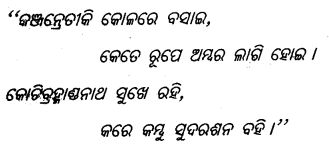
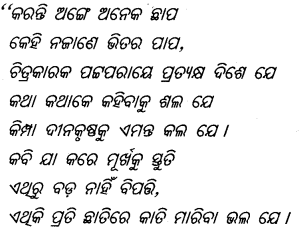
![]()
